#if not then it will certainly have comedic elements to a degree
Explore tagged Tumblr posts
Text
Working on my ymir tarnished fic is an experience, all my better developed scenes and notes are all in the later chapters
I want to work on chapter 2? No no, says the brain, think only of the emotional stuff that threatens to devastate you later on
#depending on where and how i reign myself in overall the series might be tragic comedy#if not then it will certainly have comedic elements to a degree#i just like the thought of ymir trying to install a greater sense of humanity and decency and manners into a tarnished and having#limited success#ludwig; hey thanks for letting me camp on your land its nice having spmewhere where not everything is trying to kill me#ymir; ok but i would feel even better if perhaps you stayed inside at night#ludwig; fine but im sleeping on the floor#ymir; not in my fucking house youre not youre not an animal#Ludwig might get stood accidently on at some point we'll see how it goes
2 notes
·
View notes
Text
The quotes that I picked this week are based on Chaplin and melodrama. The common theme that I saw was the power of cinema through emotions and Chaplin’s overall process involving melodramas. The quotes I chose were:
“Certainly the movies, like the stage melodramas they have largely superceded, have long been a source of powerful and usually uncritical spectatorial emotions.” (Williams, Linda. 1983. Review of Cinema and Sentiment by Charles Affron.)
“The New York Times critic in his review of The Gold Rush was particularly impressed by Chaplin’s “acting with his back” at this moment, his ability to express loneliness through the way he held his head and shoulders. As impressive as Chaplin the actor is here, Chaplin the director also manages a high degree of expressiveness, establishing an important contrast between the two key elements of the image.” (William Paul. 1972. “The Gold Ruhs.” Film Comment.
“Relating how his funniest scenes in The Gold Rush (1925) were inspired by a grim account of the bitter cold, starvation, and cannibalism experienced by the Donner Party, he later recalled, "In the creation of comedy, it is paradoxical that tragedy stimulates the spirit of ridicule, because ridicule, I suppose, is an attitude of defiance. We must laugh in the face of our helplessness . . . or go insane" (Chaplin 303).” (Woal and Woal. 1994. Chaplin and the Comedy of Melodrama.)
The first quote by Linda Williams discusses how melodramas invoke powerful emotions in their audiences, with Chaplin being a prime example. Williams doesn’t state this about Chaplin but it’s important to note when thinking of melodramas. The second quote mentions “The Gold Rush”, where Chaplin’s ability of conveying loneliness through his acting and directing is important, especially when regarding melodramas. The last quote mentions Chaplin’s creative process and that he draws inspiration from tragic events and turns them into his funniest scenes in order to show comedy arising from tragedy in order to cope.
The idea of melodramas inspired by Chaplin reminds me of the Avengers (2012). In most of the Avenger and Marvel movies, a lot of the characters use funny quips when relating to serious events in the film. For example, an alien invasion or some type of event that causes massive mayhem. Most notably, Tony Stark always uses sarcasm and is the comedic relief when referring to serious events in the Avengers films because while the situation in the MCU are serious, he tries to downplay the events for himself and the audience. The example that I use below is Tony Stark using humor in the midst of an alien invasion in Avengers: Infinity War (2018).


0 notes
Text

So,
Four shows down, four to go.
In reflecting on the organized chaos of last week, during which we saw record-breaking crowds attend the Shawnigan Players production of "All's Well That Ends Well", I can't help but feel like I'm deciphering a dream, or maybe a hallucination. Becoming a character on stage is certainly akin to being in some sort of altered state, and at times it's hard to decide whether you experienced something as an actor or as the character now operating in your brainspace.
The audience has brought an additional electricity to our collective endeavour, and sometimes I feel like I'm channeling raw emotional energy from places left unexplored during ordinary life. I scream, I cry, I kiss, I fight. My favourite moment came on Friday (or was it Saturday?) when I paused for a moment before delivering a particularly funny line, only to have the audience burst into laughter at my facial expression alone. By the time I'd milked it for an additional few seconds it felt like the line was unnecessary, because I'd already communicated my comedic anguish through silence.
There's a number of unique challenges with this show, like the fact that it's double-cast (I have to be bullied by two kings of different temperaments and seduce two young virgins of radically disparate heights). Sometimes we have a real baby on stage, sometimes we have a doll. And during the matinee performances, as the blazing sun bakes our black stage, I have to accomplish a certain level of emotional realism while simultaneously blinking away forehead sweat. But maybe the most challenging part is my final scene pivot from boy to man, where I go from screaming dramatically that my accuser is "a common whore to the camp" to being earnestly transfixed by my true love within the space of a single minute.
We performed over eight hours of live theatre last week, but my memory is drawn to moments that couldn't have lasted more than a few seconds — the time I pronounced "thoughts" as "thotes", the time my prop sword bent at a 90-degree angle in the middle of a battle scene, and two particular occasions when dropped lines led to pregnant pauses. It's hard not to keep an inventory of my missteps, and at times I find myself letting them overshadow the overwhelmingly positive response we've been receiving from the audience.
If I'm being honest, I'm feeling a low level of dread about our final performance on Sunday — I definitely don't want this to be over. After months of rehearsals, making recordings of my lines, trying on costumes and stressing over blocking and meeting new people, we finally have this show dialled. It's profound in a way I never fully comprehended until recently, and each show a new brilliant witticism or thematic element makes itself apparent. I'm deeply, intensely proud of what we're doing and I don't want it to pass into memory.
I'm not ready yet!
This is why theatre is such a unique art form. It's temporary. Even if you record the performance (which we did), it will never adequately capture the magic of what's happening in the moment. I feel like a corny high school drama teacher when I assert this, but I believe it 100%. Lately I've been comparing it to being a graffiti artist who abruptly whitewashes his work the moment it's complete. The fact that its so ephemeral is what makes it superior to telling stories through film and TV, what makes it hypnotic and unique and insane.
It says something about life itself, really.
All of this that's happening right now? It will never happen again. The Literary Goon
0 notes
Text
It's obviously an open marriage, because neither is keeping it a secret, hugely upset about other partners or trying to make the other stop.
Being in an open relationship doesn't mean that you never get even a bitty bit jealous, just that you don't consider it important or dealbreaker-level unpleasant. IRL poly ppl often have workshops on how to overcome or constructively deal with jealousy.
From her PoV they've been married since just after she finished her archeology degree, and from the get-go River still constantly mentions that she's dated various ppl, including androids & nestene duplicates etc. within the Doctor's earshot.
The Doctor not mentioning every single past companion (love interest or otherwise) or going into details of his personal life is an established pattern and more down to his tendency to always keep moving & not look back, so I wouldn't read any more into him not going into detail about River than not having mentioned Sarah Jane to Rose or Mel to Donna.
Plus, I don't think he really expected to run into River again after 'The Angel's take Manhattan' (except for what he knew would be their last meeting on Darillium, which he was probably putting off indefinitely)
The Doctor's irked response in THoRS isn't just jealousy but that he gets a look into what she acts like when he's not around and he finds out she fake married a guy to take his head off - that's gotta make him wonder how well he really knew her in all the time they were together - it's a story about how they resolve the gap in emotional intimacy that was always there between them previously.
Overall it seems like River made a lot more use of the arrangement than the Doctor did, seeing as the accidental engagement with Marilyn Monroe looks to have been comedic misunderstanding more than anything else. The only other serious relationship we see him have is with Clara.
And even then, River & Clara didn't really overlap that much aside from that one meeting with River's Data Ghost; He considered his involvement with the Ponds over when he met Clara (referring to River as an 'ex' even), & Clara was dead by the time that he finally did do Darillium. (which turned out to be a whole lot longer & more substantial than he perhaps first expected) - & Clara seems fairly cool with it, too, seeing as she's perfectly content to throw confetti for 10 and Elizabeth. Which is something that makes her suitable for him.
I mean, if you're super jealous & place a lot of importance of exclusivity that's totally legit, but then you're probably not really suited for getting with someone who lives in a time machine, is almost certainly gonna outlive you and has been/will be with numerous ppl before and after you.
It's also sort of part of the whole nonlinearity with the out of order meetings that you can't so neatly affix a start or an end to River's involvement with the Doctor or when exactly they 'started' or 'stopped' being together.
---
Speaking of Clara, I would consider her to have come pretty close to having at least an emotional (though almost certainly not physical) affair in the second half of series 8, cause she was explicitly telling both guys different stories, and they were very much upset about it - especially with the thing where she's saying ily on the phone but very much looking at the Doctor... it's also definitely something she feels very guilty over ever after, especially since Danny just happens to die before she can clean up her act & make amends.
Despite all the phantastic sci-fi elements it stands out as a fairly realistic scenario for how a sympathetic-ish person could slide into it - she thought things were finished romantically after they'd danced around putting a label on it for 3 years & she accepted that they're gonna be just friends from now on & tried to do the responsible thing and move on and find a reasonable realistic match, but then she wasn't so finished after all with the old flame.
She's a character who holds herself to high standards which is often her strenght but in this case not being honest with herself about what she wants & forcing herself into what she things she should do created problems... and it's also why she flips out to the extent that she does when she not only fell short of her ideals but then suddenly she can't fix it anymore.
*Poll inspired by typical ambiguity in the new audio story Victory of the Doctor, which on an unrelated note is amazing!
Evidence for each argument beneath the cut!
Open marriage
The Doctor's wedding to Marilyn Monroe occurs in A Christmas Carol, when he storms off to a chapel with lipstick marks on his face. “I’ll just go and get married then, shall I? See how you like that. Marilyn? Get your coat!”
While he wasn't yet with River then, he maintains this relationship afterwards, apparently with River involved. In the mini-episode Good Night, the Doctor enters the TARDIS with a euphonium, calling over his shoulder, “River! I’ll see you later! Tell Marilyn she’s too late, she’ll have to use the biplane. Take care!”
Another piece of evidence comes from The Wedding of River Song, when they're passive-aggressively flirting.
“Hallucinogenic lipstick. Works wonders on President Kennedy. And Cleopatra was a real pushover.” “I always thought so.” “She mentioned you.” “What did she say?” “Put down that gun.” “Did you?” “Eventually.” “Oh, they're flirting. Do I have to watch this?” (from Kovarian)
I've never understood the innuendo (please tell me what I'm missing), but Kovarian does, and as we know from The Husbands of River Song, the Doctor and River are both married to Cleopatra, so… it's definitely something.
There's also that diary page in The Eternity Clock game that suggests the Doctor, River, and Jim the Fish got blackout drunk at karaoke night and started “some sort of religion of love” which went on to last for centuries.
Serial cheaters
“How can you be engaged, in a manner of speaking?” The Doctor is jealous in Flesh and Stone before he's even kissed her, which doesn't set him up as a person who'd be interested in an open marriage.
“No, wait. That's your husband? That's who you're married to? Not anybody else?” In The Husbands of River Song, the Doctor is clearly not expecting the other husbands. Culminating in the same episode…
“So, King Hydroflax?” “Oh, how many times? I married the diamond!” “So you say.” “Elizabeth the First!” “Ramone!” “Marilyn Monroe!” “Stephen Fry!” “Cleopatra!” “Same thing!”
It appears he is well aware of her other spouses (and that she's aware of his); so perhaps his surprise was more that didn't expect her to be so flagrant about them. It makes him insecure (“I posed as his nurse. Took me a week.” “To fall in love?” “It's the easiest lie you can tell a man. They'll automatically believe any story they're the hero of.”) enough to start an argument about it.
River also expresses her jealousy as an obvious fact, as seen in The Day of the Doctor Novelization (written by Moffat who (along with Alex!!) knows the character best):
“Ow!” “Madame de Pompadour?” “Jealous?” “Of course I’m jealous. Keep your hands off her.”
In The Name of the Doctor, we learn that the Doctor, who has had a number of... sexually-charged moments with Clara (including, but not limited to, Victorian Clara), has avoided telling her that River is his wife. Vastra is uncomfortable with having to introduce them, having “gone a darker shade of green.”
“The Doctor might have mentioned me?” “Oh, yeah. Oh yeah, of course he has. Professor Song! Sorry, it's just I never realized you were a woman.” (from Clara)
Actually both
This could mean many things (i.e. open marriage with boundaries which are violated), but potentially, all the same evidence from prior arguments! With a shade of “Our lives are back to front.”
In the mini-episodes First Night/Last Night, when River, having burst into the TARDIS and pretended to faint, mistakes her past self for another woman the Doctor's hiding from her, she openly expresses jealousy.
“Doctor. Have you brought someone else here? Does anyone agree to wear that dress? Where is she!” “River, think it through!” “This happened the last time we were here. You brought someone else!” “No I didn’t!” “Yes you did, I heard you talking to her!”
However, when a third and significantly older version of River makes the same mistake, she no longer expresses jealousy, but rather curiosity, which could at least signal a shift in how she sees their marriage.
Maybe there was a conversation that happened. Maybe it slipped the Doctor's mind when he forgot Clara.
Actually neither
This could also mean multiple things, but one of those things is this. The Doctor is a widower from the start. Likewise, River is well aware of Doctor's death on Trenzalore, “of course River would know, she's always known,” having been raised to prevent those events, and having refused to be bound by that destiny.
How can fidelity be defined the same way for time travelers? Everyone's spouses are dead somewhen. River understands the paradox of her husband's existence better than anyone. To quote The Day of the Doctor Novelization yet again…
‘Because you live in a time machine. All of history is still happening outside those doors. On a good night that means everyone you ever met is still alive and you can’t wait to see them again. On a bad night, it means everyone’s dead, and you want to charge around the universe, pretending you can do something about that.’ She looked up at me. ‘I know which version of you I prefer.’
And there she was, so alive again. I remembered her, twisted, burnt and dead, in the depths of The Library. ‘What if there are people who died because of me?’ I asked. ‘What if there are people I should have saved?’
‘People die. All people, everywhere. We grieve and we move on. That is how we respect the dead. That is how we forgive ourselves in their presence and their absence.’
Please feel free to add anything I missed!
20 notes
·
View notes
Text
Review: Kaiju No. 8 vol. 1
By Dustin Cabeal
The quick and straightforward way to describe this is a Kaiju take on Marvel’s Damage Control. Damage Control asked the question of “who fixes the city after a superhero battle” and has varying degrees of seriousness and success of the years. Kaiju no. 8 begins by asking the question, who cleans up after a giant Kaiju is defeated? Certainly not the people that put the monster down, that is for damn sure.
The story follows Kafka Hibino who works for a cleanup crew that hacks up and gets rid of defeated Kaiju. He is assigned a new part-timer to train, and they share an awkward exchange when it comes out that Kafka wanted to join the defense corps before setting into his role as a cleaner. The new kid, Reno Ichikawa, is interested in why Kafka gave up and at first, they do not particularly like each other. Eventually, they find themselves a ground zero for a new Kaiju appearance and Kafka saves Reno and vice versa. The two men end up in a hospital and talk about joining the Defense Corps together as Reno and reignited Kafka’s interest. Which is all great until a bug looking Kaiju flies into Kafka’s gaping mouth and turns him into a Kaiju.
The two men end up fleeing together as Kafka discovers his newfound powers and eventually turns back into a human. They story then flashes forward several months as the two men get ready to take the practical test of joining the Defense Corps. They meet a prodigy girl that’s only sixteen years old that wipes the floor with all the Kaiju, which is until another humanoid Kaiju shows up and revives all of them making them more powerful.
Having the second volume of this series already it was incredibly difficult to stop myself from reading it. Manga reviews tend to get messy when you have too much story material to pull from and I really wanted this first volume to get its fair shake before I dove into the second volume. While I want you to read this review, I also want you to stop reading it and go check out the story as it has the makings of the next big thing from Viz. There are only a handful of stories that I have had this same desire with, One Punch Man, Black Clover and Twin Star Exorcists. Those are all heavy hitters in the manga and anime world.
What is nice about the story is that for once it is not about a high school kid. It is a dude in his thirties deciding not to give up on his dreams and getting a second lease on life. He is not trying to be the best; he is trying to be a part of a team that he feels makes a difference in the world. During the practical test he plays a support role knowing that without his Kaiju powers he can only do so much. Yes, there is the childhood friend storyline in which he is trying to catch up to her, but at least right now he is not trying to be best or the top dog. He is just trying to get a role on the team.
While the writing and characters are nothing particularly new, they are masterfully written. Well written character types will succeed every time because it is good enough to hook you and that is what happens with Kaiju No. 8. Frankly, I would have been happy with the story sticking with Kafka cleaning and gutting monsters, but where it went was enjoyable and relatable.
The artwork is well-balanced. It does comedy well, but then it also stays serious when needed as well. The two share a style rather than one breaking from the style like it often does when comedic elements are added to a story. Kafka’s Kaiju form is detailed and very cool looking. There is definitely some recent manga and movie influences on the design which gave the Kaiju a distinctive look. Overall, the action and designs are wonderful.
Simply put this has the makings of being the next big manga. It is not a perfect first volume as there are several wasted pages introducing a character in the least interesting way possible, but overall, it is an addictive read. I cannot wait to see what happens in the second volume and I will likely return with a review when I do. For now, it scores extremely high, but falls just short of a perfect score.
Naoya Matsumoto Viz Media
Score: 4/5
4 notes
·
View notes
Text
The Lost World by Arthur Conan Doyle

A photograph of Conan Doyle (as Challenger) and friends, dressed up as the expedition in the novel, and published with the novel in its original serialization in the Strand Magazine.
The Lost World by Arthur Conan Doyle, first published in 1912, is one of the most influential adventure novels ever. It had its predecessors in Victorian fiction, such as Verne’s Journey to The Centre of the Earth and Haggard’s King Solomon’s Mines, both are actually referenced to in the text as a homage. But The Lost World is still one of the models for stories about adventure in general and dinosaurs in particular. You can see traces of its influence in Edgar Rice Burroughs’ Pellucidar stories, the Indiana Jones movies and the Jurassic Park books and movies (the second book and movie were both titled “The Lost World” in reference to Conan Doyle).
It is about the discovery of an almost inaccessible plateau in the South American Amazon, “The Lost World” of the title. The hot-blooded English zoologist Professor Challenger is the first to bring back news of it to the Western world. He argues that on the plateau, creatures long thought exist still live, including dinosaurs. Challenger organizes an expedition from London to explore the plateau further. It consists of the journalist Edward Malone, who is also the narrator of the book, Lord John Roxton, a hunter and adventurer and Professor Summerlee, a rival scientist to Challenger.
The book is undoubtedly a fun and exciting read. The story about venturing into the unknown, encountering dangers and finding supposedly extinct creatures like dinosaurs is well-told and exciting. The use of a first person narrator, Malone, writing down the adventure as it happens adds a sense of suspense and immediacy to the story.
The sense of fun is added to by the humour of the book. The adventure elements of the book exist in union with strong elements of comedy. The book, for all its influence on the subsequent genre, came late to the era of imperial victorian/edwardian adventure fiction. And there is an element of parody to it’s awareness of the genre’s conventions. Professor Challenger is a strange character, and the book pokes fun at his self-centredness, self importance, mood swings and general eccentricity in behaviour and appearance. It also takes six entire chapters out of this 16 chapter novel before the adventurous journey begins. And this beginning part of the book, set in London, besides introducing the plot and characters, is primarily comedic.
There is of course an inherent difficulty in such switches of moods between suspenseful adventure and comedy, but the narrative manages it well.
Certainly, the portrayal of dinosaurs is outdated in many ways, although the strength of the storytelling is able to overcome any such problems. The differences to our modern understanding of dinosaurs, both pop cultural and scientific, are still interesting. For example the large carnivorous dinosaur that threatens the heroes is either an “allosaurus” or “megalosaurus” (neither Challenger or Summerlee are quite sure), when that role in a modern work would naturally be filled by a T-Rex.
But the dinosaur science is sadly not the only thing that is outdated. Being an adventure novel from 1912, the underlying ideology of the book is clearly colonialist and influenced by the racist thought dominant at the time. The time period merely explains, not excuses it. The very premise of the book rests on the far from innocent ideology of the white “explorer” and “discoverer”.
It is telling that Challenger and his doomed American predecessor Maple White are viewed as the “discovers” of the plateau solely because they are the first white men to stumble upon it. They later discover a tribe of “indians” had not only discovered the plateau first but even settled it, but this is treated as of lesser importance than Challenger’s discovery of it.
The racism is on display in the depiction of the book’s human villains, who are described as “half-breeds”. It is not stated but implied their mixed-race origins led to their villainy. It is most evident in the “apemen” the explorers find on the plateau. They are a “missing link” between apes and modern humans. They are explicitly stated to be entirely non-human for unclear reasons, a purely evil and repugnant species, fit only for extermination and slavery. The ape-men might not be intended as analogues for a racial other, as their non-human nature stands in contrast to the people of colour in the book, but the effect is still present.
The treatment of people of colour is complicated, because it is not uniformly negative. The black assistant Zambo is treated sympathetically, as is the “indians” the explorers find on the plateau. But the portrayals rest on stereotypes, the loyal black servant and the primitive native tribe. And it is always dependent on those sympathetic people of colour being subservient in varying degrees to the white heroes. The Indian tribe is the closest the book gets to a complex portrayal, as their members have differences of opinion and the possibility of them turning on the white heroes is always a possibility, without that marking them as evil.
The duality between “civilized” and “barbaric” is also undercut in ironic ways sometimes. In fighting the apemen, the white heroes gets involved in a “primitive” darwinian struggle for survival and even the narrator is taken back by his own bloodlust. When they leave, there is also the sense that their discovery will lead to the western exploitation of this untouched wilderness, destroying it.
The book’s comedic elements resurface when Professor Challenger is also shown to have a near-doppelganger in the form of the leader of the apemen, which enables him to get on a friendly footing with their leader. This revelation is foreshadowed by the contradictions in Challenger’s character, who seems to combine both the aspects of civilization and the “barbaric” or animalistic in one person. He is an intelligent scientist, but can also be a hairy, violent and emotional brute. Challenger is not a very sympathetic character, despite his heroic traits, but these contradictions make him interesting.
Another factor is that the novel also bears traces of Conan Doyle’s own stance against the worst crimes of imperialism. The character of Lord John Roxton is influenced by Roger Casement, who was Conan Doyle’s friend and ally against the abuses in the Belgian Congo under King Leopold’s rule. Casement later reported on human rights abuses against virtually enslaved native workers on rubber plantations in Peru. This influenced Roxton’s backstory in the novel, where he is said to have waged a veritable war against a similar (or perhaps even identical) situation in Peru.
The Lost World is highly worth reading for anyone who looking for a fun adventure novel. Of course the reader’s enjoyment is predicated on them being able to look past it being a deeply imperialist text. But if you are able to do so, you’ll find a highly entertaining story in its pages. Those who like me love the Sherlock Holmes stories will find the immense writing and storytelling skills of Arthur Conan Doyle fully evident in this book.
I read the Oxford World Classics edition of the book, which I highly recommend chiefly for its annotations, created by Ian Duncan. They explain a lot of obscure words and references to contemporary political and cultural events and other novels that I would otherwise have missed. The introduction by Duncan should really have been placed as an afterword (it is best read after the reader has read the novel), but is good at explaining the historical context and ideological underpinnings of the novel. The Oxford edition was really helpful in my writing this review.
21 notes
·
View notes
Note
I just want to say I am absolutely obsessed w all your sincerely me posts. You do such a good job breaking them down and identifying all the little details that go into that scene as well as analyzing what they mean about Jared and Evan separately and ofc their relationship as a whole. Wonderful stuff! Also the compilation of Will doing The Laugh added 10 years to my life so thank u
oh thank you lmao i always enjoy people enjoying those posts, and there’s always so much to dig into with that scene, but i think plenty of times i think people can just sort of let the scene wash over as a “oh, the point of this is just that it’s fun” sort of surface level, very straightforward element of the show, and part of the point surely is that it Is fun, but everything about this song is about evan and jared’s interaction / dynamic / relationship here, and the levity and humor doesn’t mean there’s nothing here to Take Seriously, which is certainly true re: jared in general, rather than him being Jokes Boy with no real feelings or anything (i know i’m already preaching to the choir here with all this “here’s what sincerely me is Really About / what deserves more appreciation re: jared” lmao but the ted talks just Occur)
like, here’s the high point of the whole show for jared, and this moment with evan which is so enjoyable and satisfying that he’s going to keep hanging on to evan’s runaway train in the hopes of getting more of this, particularly in act 2 where that’s truly like 100% of his motivation (vs that in act 1 he’s at least also having some degree of an earnest response to the idea behind tcp along with evan and alana, even if it’s still plenty about doing this With Evan) and like, it’s especially a tragedy re: the album where you Only get jared’s vocals, & have less of his dialogue, so it’s easier to forget he’s there or what his part in this is and that, you know, this wouldn’t be a song if it wasn’t about His And Evan’s relationship, and it’s like 98% the case that “connor” in this song just Is jared
and that yeah like we’ve been recently posting lol how there’s actually really just these endless Layers to this material, a mille feuille of Relationship Analysis that’s getting folded over again and again, where it’s jared and evan for real, but pretending to be other people, and making things up, but trying to make it seem Real, and both taking the other’s feedback into their own writing / working off of the other’s contributions, and evan could be seeing “connor” through the lens of what little he knows about actual connor, or projecting himself onto someone he realizes was similar to him in ways, or being informed about Friendship via his own relationship with / perception of jared, who’s in a similar position here re: what’s behind his Inspiration or Interpretation, which roles are Him, or Evan, or ostensibly connor, and what all projection or wish fulfillment or Interpreting is going on around here, not to mention that these two Real People’s Real Dynamic is unfolding right in front of us and is very directly what’s going Into these created emails (which do, apparently, seem like the record of an amazing friendship according to cynthia and then like, a bunch of other people) because this whole writing session is this collaborative back and forth which wouldn’t be happening in the first place if evan didn’t turn to jared for input/help with anything and if jared didn’t want to be involved in evan’s life and be someone evan Wants to seek out like this and you know, how delighted jared is to have evan’s attention, even if as he starts giving evan what he’s actually after here, evan’s attention seemingly shifts over to “connor,” even though that’s jared.....still not a direct Win for jared there, see: him in the reprise, trying to put a “jared” into the story as well, since evan’s invented relationship with jared!connor isn’t actually translating into evan being closer / more interested in actual jared....what about jared!jared......now i’m even thinking about jared getting that highest note harmony at the end of sincerely me.....pay attention to Him
thinking allllllways about how jared completely invents the chorus himself, expecting evan to approve, and with no input from evan, just that Approval, and it comes on the heels of also-approved writing for connor about Trying To Be More....Nice.....i’ll turn it around, wait and see...........just about to lie down about the fact that this, on top of what evan’s already made up in for forever, is about trying to make this Hopeful story, because that’s what evan wants for himself, and what he thinks cynthia would find comforting re: connor, and here’s jared like, okay, so your Supposed relationship didn’t look that warm & amazing from the outside, but how about if it just had a lot of Potential, like, HMM!!! lots to consider there!! but then Oof at the fact inevitably the story falls apart and so does jared’s hopes for his relationship with evan, even though like, connor died & never had that friendship with evan, & jared is probably still alive & Did have a connection with him & is presumably still out there, able to be talked to, maybe try reinventing and giving things attention, you know
just that Yeah lmao the tl;dr here is people mostly going like wow lol what a fun song, &/or a gay song, & it’s like, well sure but for one thing, all of that is completely due to Jared & his and evan’s dynamic & relationship, but that once you realize that that’s what the song is actually about, there’s just so much to consider and analyze in what might otherwise be overlooked as a song that has nothing to to say besides what’s most straightforwardly there, even though, you know, these are characters who have so much trouble saying what they mean or feel or want, but who are able to Reveal more about themselves in that way through this pretense/artifice which is sort of displacing their usual defense mechanisms. been Thinking About It many times and i’m still pondering aspects of it afresh / having new Insights, and anyone else can be too lmao, lots going on here & lots to say based on what anyone’s experienced / taken note of.....wtaw is of course v different as a song, more outright dramatic & desperate, whereas sincerely me is presented as more comedic & light, and it Is these two friends having some fun here rather than the protagonist having this crisis before homeroom at the start of the show, but here sincerely me is as another song about Trying and Wanting and some hopefulness that has to remain ultimately inconclusive, because connor still died.....lots going on, of course the tone is different b/c jared is a part of it, but people also completely overlook Other moments as jared you know, not having as genuine or deep or real Feelings as evan b/c jared’s front involves acting unbothered and being clever and funny, but obviously that doesn’t mean his feelings aren’t there and there aren’t stakes to them, and just because this song involving jared just seems lighthearted and unserious doesn’t mean that again, things aren’t Real and Important for jared.....augh
and yes lmfao the laugh is very good, i’m glad to compile it for our health
17 notes
·
View notes
Text
macrocondy3point0 said: Please do expound, friend, because I am very into hearing people talk about the show right now!
okay!
so the first thing off the bat is that I’m technically going into this blind; like a lot of people, while I had vague and approximate knowledge of He-Man, it was almost entirely just memes and pop culture jokes that I presumed had to be massive exaggerations or misunderstandings of the characters, but the only characters I was really familiar with was He-Man himself, Skeletor, and to a limited degree Orko, and that’s really because he was apparently the Scrappy of his show. I had to pick up and infer knowledge of the characters, based on what I was watching and what their interactions implied about things.
so He-Man himself is a lot more faceted than pop culture jokes assume. On one level I suspect this is a lot like how people reduce Optimus Prime to an inspiraitonal lamp that doesn’t actually do that much, when he’s got a LOT going on. I figured he was an optimistic and open-hearted person who is just so... overwhelmingly wholesome. (Which just reinforces my belief that reactionaries clinging to the series are people who don’t actually KNOW the show... or have completely missed the character of it.) But as the show goes on, you do get a sense of Adam viewing He-Man less as his ‘true self’, but as a role he’s playing; him being saddened by his father’s dismissal of him, and him opting not to appear in his mighty form in what is, for all intents and purposes, synthwave Valhalla.
He-Man actually reminds me a LOT of Shazam, particularly the takes where Billy Batson is a wholesome and all-loving person who wants to be an ideal hero, but played with nuance. (Having a talking tiger friend who is outwardly cowardly helps. If Cringer was more of a dandy, I’d make outright comparisons!)
Skeletor’s voice by Mark Hamill is honestly a BIT of a letdown; that high-pitched voice is just so iconic, it feels a little tragic that Hamil uses a deeper version of his Joker voice. In terms of character, though, I think Skeletor is on-point; I’ve seen some criticism of him being, say, an incel, but on the other hand, being an entitled little weasel is part of his character. He feels a lot to me like taking the comedic failure antagonist of the classic series and playing him exactly that, but allowed to be more menacing and do real damage. (Sort of the same thing has been done with Megatron and Cobra Commander, and it could be that since the image of Skeletor as this endearing figure has gotten so prevalent, him being honestly just a dick is probably a bit of a surprise.)
Ultimately, I think it was a good idea for the series to remove He-Man from the cast as an active figure straightaway; he has a large cast, but he overwhelms it so much that they’re largely accessories, which is a similar problem affecting Transformers and other series where it’s meant to be an ensemble, but a single character dominates the story. So this gives the others a chance to shine, especially out of the comfort zones established in the original series; without He-Man, the characters are forced to ask themselves, in and out of story, ‘what are we supposed to do with ourselves?’
Orko was absolutely my favorite; just about every line from him was surprisingly gut-wrenching, even without the awareness ahead of time of what was going to happen to him. There’s this whole thing with being the annoying character the entire fandom hated, and the series implicitly leans on this; Orko feeling he’s a failure that screws everything up feels like a direct commentary on the fandom’s general response to his original depiction, and its treated that he FEELS like an embarrassment. A lot of his character arc feels that he’s trying to deal with that, especially with the magic going away and the threat that poses.
I did not expect Lyn to have as good a character arc as she did! Interestingly she didn’t come off as... well, unpleasant. As for the rest of the Snake Mountain crew... it took Tri Clops absolutely NO time at all to turn into a tecnophile cult of cyborgs worshiping technology. I’d joke they’re like the evil version of the Adeptus Mechanicus but... they’re just the regular Adeptus Mechanicus. (I mean, they were making sermons about how THE FLESH IS WEAK. i honestly expected them to start praying to the Omnissiah to unshackle them from their ROTTING CAGES OF BIOMATTER. Between that and Trapjaw bearing a surprising resemblence to an Ork Nob, there’s a surprising amount of 40k similarities here.)
I also realized as I was watching, that He-Man as a series is a straight up Sword and Sorcery setting, with elements of fantastical futurism; the setting is barbarian heroes fighting against evil wizards, but with lasers and robot horses and robot sons. It’s even more apparent that He-Man himself is a blatant Conan analogue, certainly in terms of appearance; the previous heroes of Eternia, such as Grayskull himself, are a lot more explicitly so. This makes him even more interesting to me since he looks just like the iconic barbarian hero, but he’s a very optimistic and affable guy, and smarter than people suggest he is, which is a very interesting contrast to the expectation of a barbarian hero archetype.
6 notes
·
View notes
Note
Who do you think will Katarina end up with?
Geordo
There are several reasons for why I think this.
He is the male lead and is considered in the character introductions at the beginning of each Light Novel, to be One of the TWO leads, while the rest of the cast are divided up as secondary to minor characters.
This is how the characters are introduced in the Light Novels 1-5.
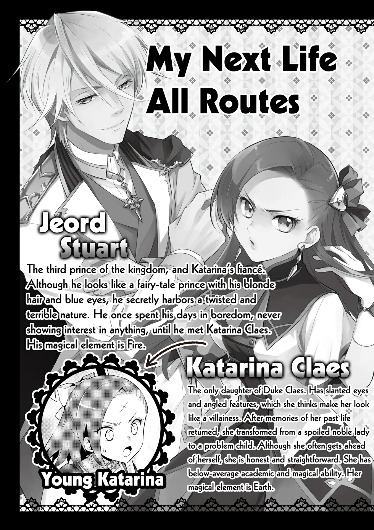
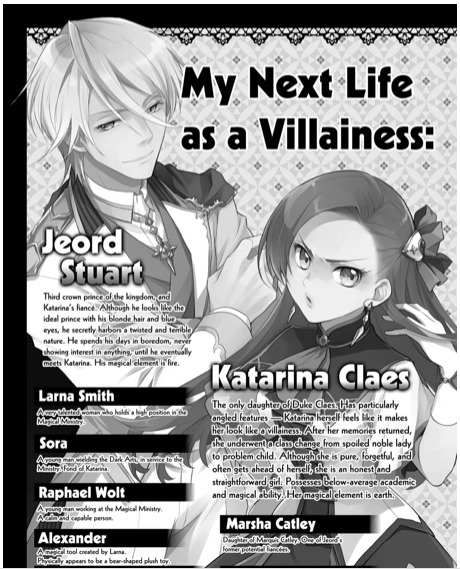
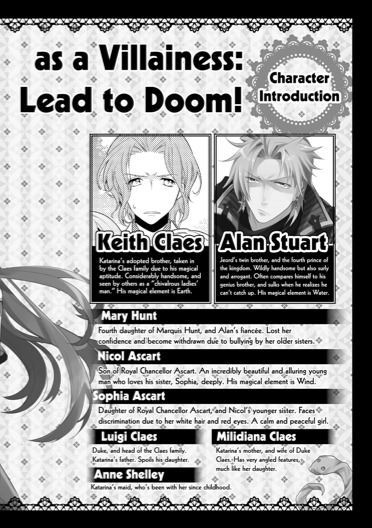
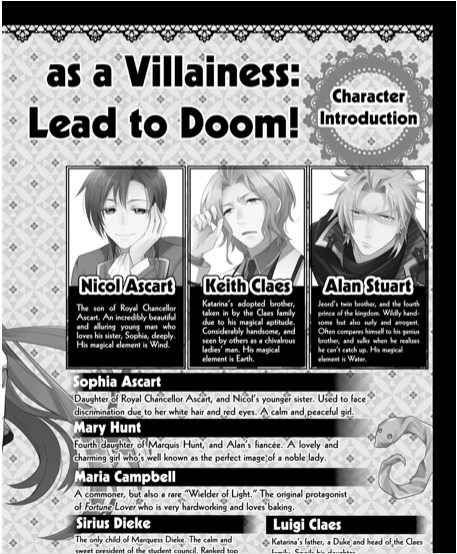

Katarina and Geordo’s character introductions are untouched for the most part from novel to novel. But the way the other characters are introduced with each novel changes bit by bit.
From Alan and Keith being marked as secondary characters in the 1st novel.
To Alan, Keith, and Nicol being marked as secondary characters in the 2nd novel.
To the entire Harem (minus Geordo) being marked as secondary characters in the 3rd novel and onwards.
Now I don’t know the characters introductions beyond the 5th novel, but I highly doubt that they have changed that much or if at all.
Katarina and Geordo are clearly marked as being equal in character importance – the Female Lead and the Male Lead.
Though, in the actual events of the story, Katarina is clearly the MAIN character while Geordo is just one of the many characters who is rotating around her.
--
Geordo is the first character who we truly meet in the story (excluding Katarina). Signifying his importance to the story as a whole.
Not only that, but he is only the first character introduced as a romantic interest
OG Katarina immediately falling for him
Geordo proposing to Katarina
Geordo and Katarina being engaged
As well as the first Doom Flag -
Katarina realizes she’s in the game of Fortune Lover because of Geordo’s name and the fact that their engagement story is the same as from the game. Because of that, we learn what that actually means for Katarina who is the villainess of the original story. Or at least, what she thinks it means.
--
Being a romantic interest and a doom flag is a character position solely unique to Geordo and Keith.
While every now and again, Katarina will bring up that Maria, Alan and or Nicol are potentially “dangerous” to her and thus people she needs to keep an eye on for her safety… in all honestly, they’re really not.
Honestly, it kind of feels like the author(s) forget that the other characters could hypothetically be a ‘threat’ to Katarina and remember it randomly at times, and thus just insert it into the story.
Geordo and Keith are the true “doom flags” for Katarina. And even in that regard, Geordo and Keith are treated somewhat differently from one another.
Geordo’s role as a doom flag, is given a lot more attention than Keith as a doom flag. Now Katarina will insure her “safety” by telling Keith that she will never stand in his way of him being in love with someone, but that’s about it, as the years go on.
Katarina practicing her magic and getting stronger in that field to avoid being killed by Keith, is basically dropped as soon as it’s mentioned. As Katarina’s magic is quickly established as being weak, no matter what she does. So, that aspect of the story is a bit forgotten as the story moves forward.
But really, I think that even Katarina realizes that Keith as a doom flag is basically a neutralized threat, because of their close sibling relationship.
Geordo on the other hand, is still treated as a Doom Flag. Essentially all of her plans of escaping her doom, are basically plans that focus on Geordo turning on her and how to escape him specifically. Her snakes and even her sword-fighting (which is brought up less than the snakes).
So, one of the main premises of the story - the romantic and comedic tension of Katarina thinking her love-interests are potential doom-interests for her – is largely dominated by Geordo and Katarina’s relationship with him.
Though Keith is a close second in that regard.
--
Rivalry
While everyone is a rival, Geordo and Keith are the two main rivals (especially in the Manga).
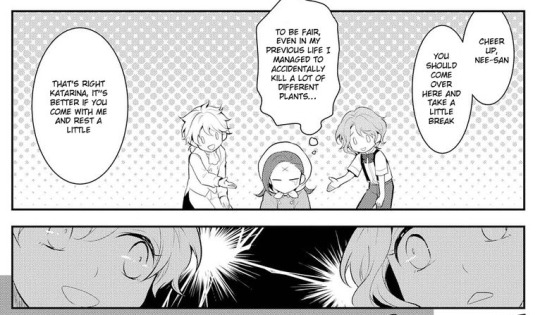
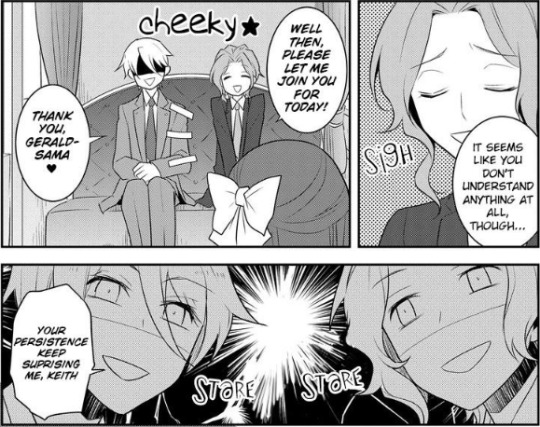
We see this with their constant passive aggressive fighting and commentary towards one another, as well as being essential and core elements to the whole Harem and its dynamic.
Now, depending on which medium your engaging with, there are very strong arguments for Maria, Mary, or Alan being a third main rival character or if not that, at least being at a higher level than the others.
Maria
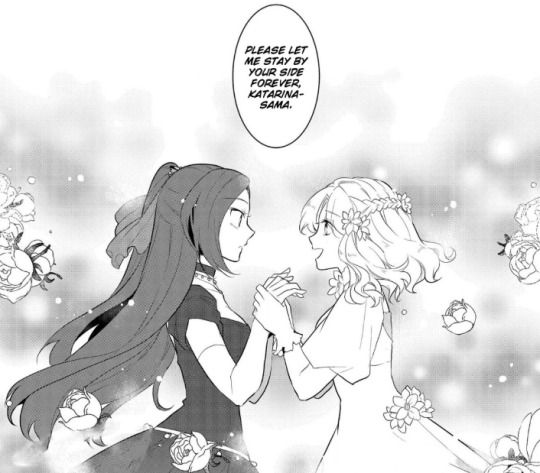
Maria is the original MC from Fortune Lover and is essential to Katarina’s fate…or at least in Katarina’s mind she is. That alone separates her from the others Harem Members.
Maria is also marked a being different the the rest, by being the newcomer to the Harem, and her and Katarina’s relationship (friendship and more) is a factor to the overall story.
All of that marks her as being if not a main rival, then certainly higher than others.
Mary
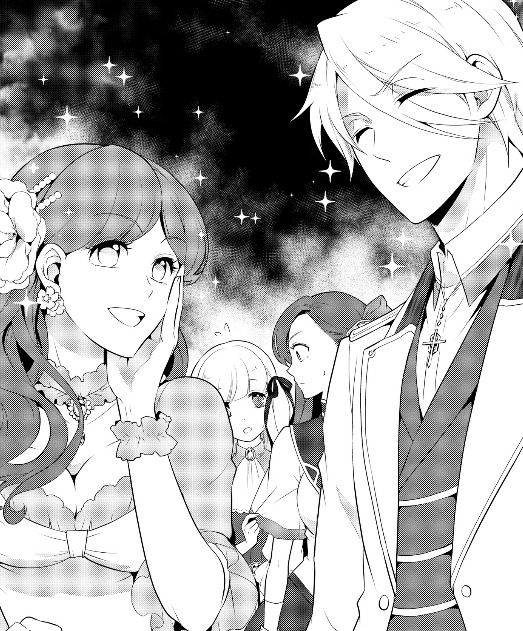
Mary get in the thick of it as much as Geordo and Keith do (especially in the novels). She is a constant thorn and wrench to Geordo and everyone else, but mostly Geordo.
Alan
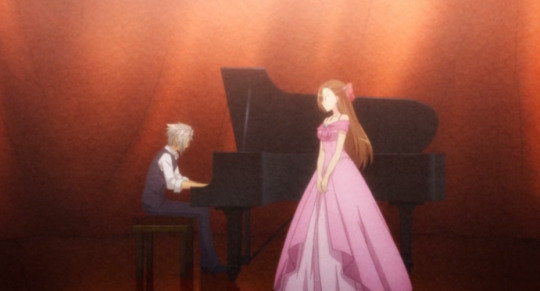
Alan, because of his character design and popularity among fans, he gets leveled up and is given more attention as the story continues to progress and the anime clearly cements him as a main rival.
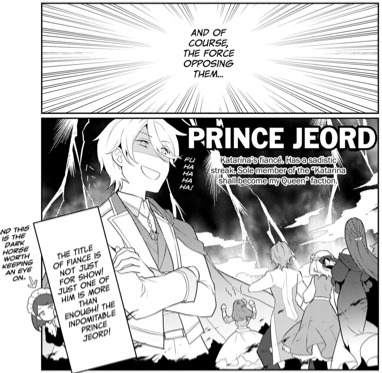
As shown in Vol 5. Geordo is the main rival to everyone and they’re all separated into groups into what their roles are in regards to breaking Geordo and Katarina’s engagement up and keeping them apart.
While really for comedic sakes, Geordo being the biggest opponent to everyone does, to some degree, tell us about his chances with Katarina (or at least I think so).
--
Kiss Scenes (LIGHT NOVEL SPOILERS BELOW)
In Novels 1-5, there are essentially 8 kisses that Katarina receives from the other characters (on her hand to her lips).
Out of these kisses, Geordo is the partner 6 times. Out of these kisses there are 3 pictures, that while not depicting the kisses themselves, do depict the moment just before. All of those pictures depict Geordo’s kisses.
Hand Kiss – Geordo (Vol.1)
There is a picture depicting the overall proposal scene, but not Geordo kissing Katarina’s hand or him about to.
Neck Kiss – Geordo (Vol.1)
There is a picture of Geordo hugging Katarina as they dance, right before he kisses her, but I didn’t really think it counted.
Water Kiss – Geordo (Vol.2)
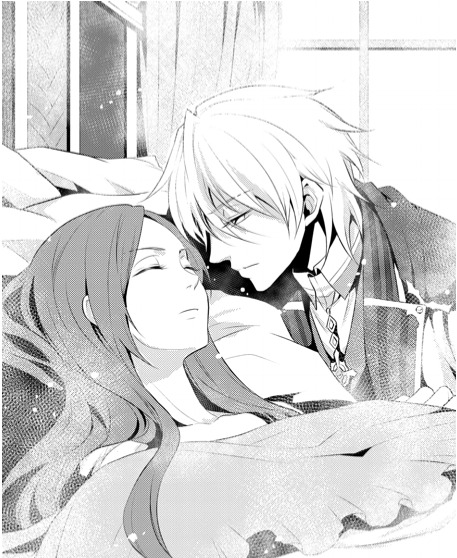
This is absolutely a kiss scene. You can debate whether it’s CPR or something else, but the way it’s treated in the context of the story - it’s a kiss scene. Simple as that.
Neck Kiss 2.0 – Sora (Vol.3)
No picture.
Retaliation Kiss – Geordo (Vol.3)
No picture.
Confession Kiss – Geordo (Vol.3)
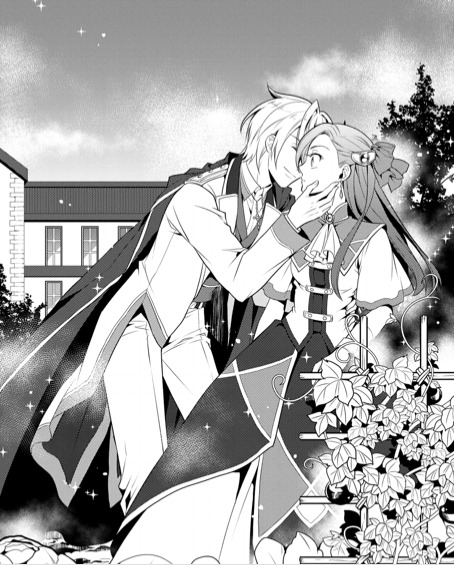
Basically, Katarina realizes that Geordo has romantic feelings for her in this scene. While she initially thought his Retaliation Kiss was just a dream of hers, a dream she was very flustered by, she is now more than aware of what is happening.
Waking Up Kiss – Keith (Vol.4)
Keith wakes up from his own Dark Magic Coma (so to speak) and thinking Katarina is just a dream, he kisses her, much to the shock of Katarina.
No Picture.
Retaliation Kiss 2.0 – Geordo (Vol.4)
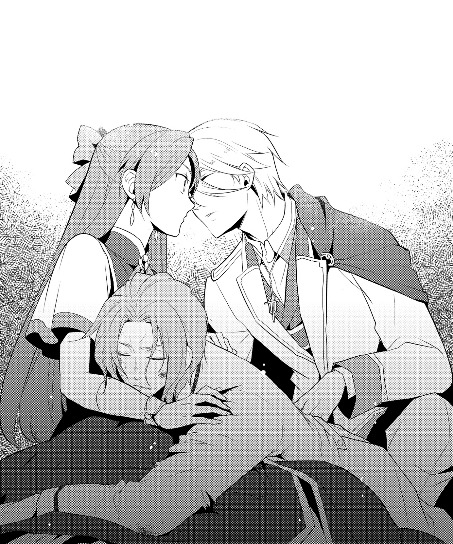
Upset that Keith kissed Katarina in the “Waking Up Kiss”, Geordo also kisses her.
This scene in particular, especiall with the picture, I think really cements Geordo as the one who Katarina will end up with.
Simply because, Keith just kissed Katarina and there was no picture depicting it even though it happened a few moments/pages ago, but yet Geordo’s kiss (or about to kiss) is depicted. So, to me, this seems very telling.
-
[Update] Originally I brought up how Nicol kissed Katarina in Vol.8 that also had a picture depicitng the scene...but that was inaccurate. There is no kiss scene between the two in that moment.
Any others, I have no idea about.
I’m just going to stick to the novels I have read up to this point.
So, let’s get to my main point. Out of the 8 Kisses Katarina receives, in Volumes 1-5. It’s very telling to me that Geordo is the one doing the kissing 6 out of the 8 times. Plus, in the the first 5 Volumes, the 3 kisses that are depicted are Geordo’s.
--
In Ch. 17.5 we have our first bonus chapter, which gives us a special look into Geordo’s feelings for Katarina. So far, Geordo is the only one who has received this treatment.
Now that doesn’t mean others won’t, but I personally think that chapter is very sweet and romantic, so given that it’s Geordo’s chapter is another point for him.
In case, you somehow didn’t know, I love Ch. 17.5
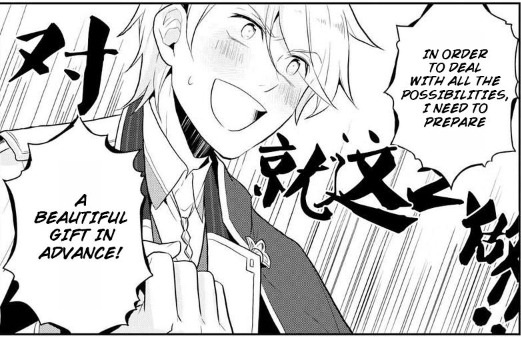
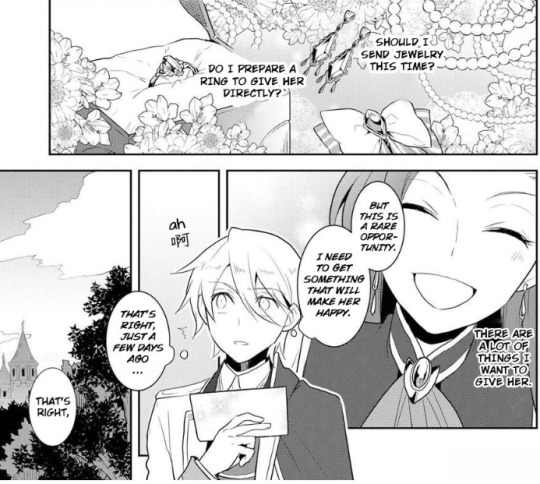
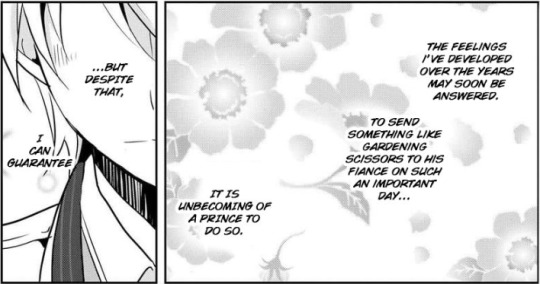
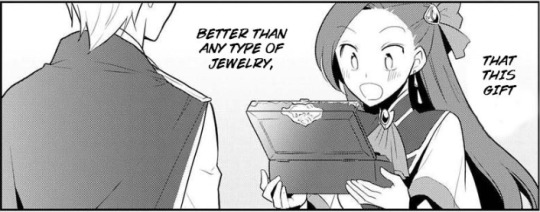
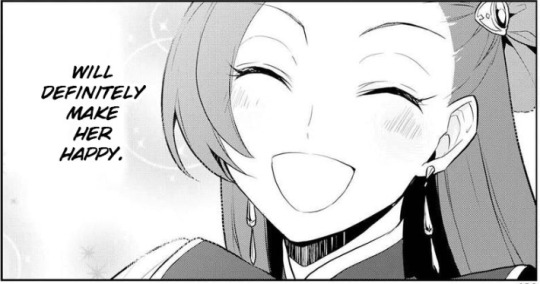
--
Finally given how the story was supposed to end at Vol 2.
It’s very interesting to me that the last chapter, is from Geordo’s POV. We get to see his view on their relationship and his feelings for Katarina, as well as the water kiss scene.
Geordo gives a brief summary of each of the characters. More importantly he thinks about how is not pleased that everyone else is in love with Katarina and how he might lose her, but he does admit that he’s okay with things staying like this for awhile longer.
Largely because Katarina is so happy.
--
I genuinely do think Geordo has the best shot of ending up with Katarina out of all the characters.
Now whether I think that because I ship him and Katarina or whether I ship Geordo x Katarina because I think he has the best chance is difficult to say. Probably both.
Thanks for the question! :)
#Katarina Claes#Geordo Stuart#Hamefura#Bakarina#Destruction Flag Otome#Otome Game No Hametsu Flag#Gerald Stuart#Catarina Claes#My Next Life as a Villainess#Anonymous
272 notes
·
View notes
Text
Michael After Midnight: Heavy Metal

Sometimes it’s fun to revisit old movies you watched when you were younger and find out, hey, this is better than you remembered! Sometimes your young mind just wasn’t ready to accept how awesome something was, and you needed time to fully understand what you look for and like about cinema to truly appreciate it. But then, sometimes, you watch something you liked when you were younger, and you realize… wow, this is absolute dog shit!
Such is the case with Heavy Metal. This is a movie I have frequently cited as a low-ranking entry on lists of the finest animated films of all time, and to be entirely fair to the film, it is important in a historical sense, being a cult classic that was passed around through bootlegs because music rights kept it from getting a home video release, and it came out around the dawn of the 80s and kind of destroyed what you would think an animated film was capable of. This film is full of sex, drugs, and rock and roll, and it entirely, unabashedly unashamed of this, for better or for worse.
Now, while I do think the overall film is a bit lacking, it is an anthology film divided into segments, and there are some pretty good ones I will make note of; this is not a film with absolutely no merit. But before that, let me point out the one thing everyone can agree is amazing about this film: the soundtrack. You’ve got Black Sabbath, Blue Oyster Cult, Stevie Nicks, Devo, Cheap Trick… if nothing else, the kickass soundtrack is worth a listen, though Blue Oyster Cult’s song inclusion irritates me to a great degree. The movie went with “Veteran of the Psychic Wars” for the soundtrack, despite the fact Blue Oyster Cult had a song ready to go that is literally about the final entry in the anthology, called “Vengeance (The Pact).” Why the people compiling the soundtrack made this choice baffles me; it reminds me of how they didn’t use “Jennifer’s Body” in, well, Jennifer’s Body, instead opting for a different Hole song from the same album.
But I digress. Let’s go one by one and touch on the segments:
The framing device is about an entity known as the Loc-Nar, who claims to be the sum of all evil, detailing to a little girl how it has influenced chaos and carnage across time and space. The thing is, though, the Loc-Nar doesn’t come out on top in any of the segments, and its schemes are often thwarted. So the entire movie is basically this supreme evil being detailing to a little girl how much it sucks ass at its one job.
The first segment is Harry Canyon, a story about the eponymous futuristic New York taxi driver. In some regards it reminds me of The Fifth Element, what with a scruffy, slummy, futuristic taxi driver trying to help a smoking hot babe find out the truth and all, but unlike that film, this short is a lot bleaker and gritty. You kinda know what you’re in for when Harry vaporizes a dude who tries to mug him, and if that’s not enough, the female lead of this short literally throws herslef at him, and yes, he gets to take a dive into her Harry Canyon – and you get to see it.
This is a running theme throughout these shorts – almost every female character has huge titties and is sexually promiscuous, throwing themselves at the first penis they see as if it was their job. It’s so incredibly juvenile and tacky as to be laughable, but I guess this comes with the territory considering the magazine this film adapted.
Anyway, the segment is harmless and unremarkable. It’s exactly what you’d expect from this sort of story, without much in the way of twists or turns.
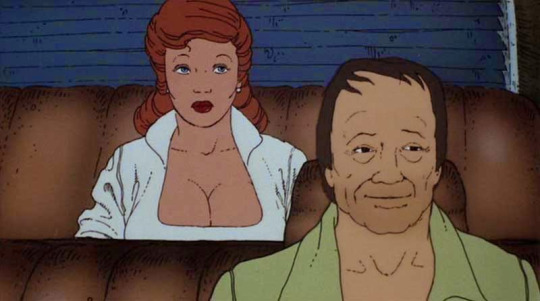
The second segment, Den, is arguably the best segment in the entire film. We have a nerdy kid named Dan who gets transported across space and becomes the musclebound warrior with a huge cock known as Den. Every woman throws herself at him, every villain in his way gets pummeled, and no task is too impossible for this man! And did I mention that he is voiced by John Candy? Really, Candy’s comedic touch is what makes this entire thing feel fun and palatable; it’s a cheesy swords and sorcery romp through and through. Honestly, I don’t have much bad to say about this one, it’s just very silly fun.

Unfortunately we are back to being not great with Captain Sternn. Sternn, played by Eugene Levy (of The Wacky World of Mini Golf fame), is basically an intergalactic war criminal on trial, and when his paid witness Hanover Fiste (played by Rodger “Squidward Tentacles” Bumpass) comes up to the stand, the Loc-Nar influences him to the most evil act possible… betraying this war criminal in front of the judge and jury! GASP! I’m not sure what the Loc-Nar is really trying to do here; you’d think it would maybe want Sternn free to continue spreading wicked influence across the galaxy, but nah, it just makes Squidward hulk out and tries to kill him, only for the tables to be turned and Squidward to be dropped out an airlock, further cementing how utterly useless the Loc-Nar is.
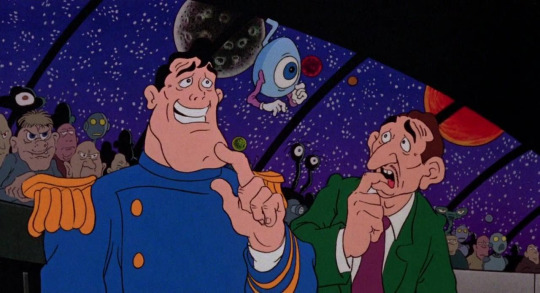
Thankfully, once that’s over, we have yet another very strong segment, another contender for best in show: B-17. This is a genuinely creepy zombie short film, and the zombies are utterly horrifying and grotesque. This is regarded as the most nightmarish part of the film, and for good reason; this shit is certainly worthy of being called “heavy metal.” Honestly, there isn’t much bad to say about this one either, except perhaps that it is over far too soon.
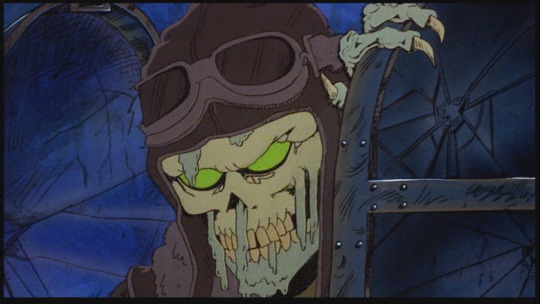
Then we get to what is probably the worst segment: So Beautiful, So Dangerous. The entire segment is sort of meant to be a lighthearted comedic breather between The last segment and the final one, but it just comes off as combining every problem the movie has into one segment: the uselessness of the Loc-Nar, copious and ridiculous sex, drugs, and so on. Really all that’s missing from this is gratuitous violence, but hey, guess you can’t have everything all the time, right? It just comes off as really dull and pointless, and there’s not really anything particularly funny about anything that happens in it, unless of course you’re a thirteen year old who thinks “big boob woman having sex with robot while aliens snort cocaine” is the funniest shit on Earth.

Thankfully, we end on a strong note with Taarna, which is about a proud warrior woman dressed in horrifically impractical armor (and this actually effects the plot, I’m not kidding, somehow there was some self-awareness here) and a cool alien pteradactly flying off to fulfill a vengeful pact after the slaughter of a peaceful race by barbarians mutated by the Loc-Nar, in what may be the Loc-Nar’s sole impressive feat. Taarna is the ultimate hero, giving us the trifecta of qualities a heroine in this movie should have – boobs, butt, and bush... Er, I mean, sword, cool mount, and ass-kicking prowess. This one is not quite as good as “Den” or “B-17,” but I still think it’s a solid finale that has enough action and awesome music to make up for its tackier elements.
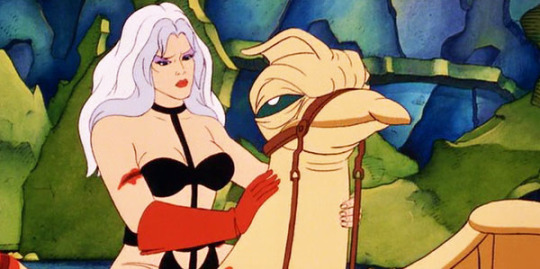
The movie ends with Taarna’s defeat of the Loc-Nar echoing through time and killing it which… makes absolutely zero sense, but whatever, the Loc-Nar is an absolutely atrocious villain and perhaps one of the most useless in cinematic history, he gets a 1/10 on Psycho Analysis. Then the girl gets her own kickass space dragon thing and becoming the new Taarna or something and, honestly, it’s the exact sort of batshit ending you should expect from the film.
So, is this really an awful film? In some places, no. It’s a love letter to cheesy, trashy sci-fi fantasy from the 70s, with all that comes with it, and in that regard it does succeed. But still, a lot of the film feels like the utterly juvenile fantasies of same sad high schooler, or perhaps even middle schooler, who has never had and who likely never will have sex. It’s a tashy little time capsule to a bygone era where this sort of storytelling was okay so long as there was enough blood and titties on display, so if that appeals to you, by all means, check this film out. It’s certainly not the worst thing in the world to watch, but animation has come so far and adult animation in particular is capable of so much more than adolescent masturbatory fantasies that this film has little value beyond a few solid segments and a damn good soundtrack.
Hell, just go listen to the soundtrack. I think you’d have a better time doing that.
#Michael After Midnight#Review#Movie review#Heavy Metal#animation#animated movie#sex drugs and rock and roll
20 notes
·
View notes
Text
Inside the Mortal Kombat Movie’s Bloody Love Letter to Martial Arts
https://ift.tt/3sPd50L
About 10 hours into a November 2019 flight to Australia and the set of Warner Bros. Mortal Kombat reboot, I started to ask myself whether this was all worth it. I loved the original Mortal Kombat movie about as much as anyone unironically can, but the fact remains that the history of live-action video game film adaptations is paved with disappointment. Even the best movies in that field have earned their reputation largely by exceeding low expectations.
After nearly 30 years of failed attempts, it’s hard to even picture what a good live-action video game movie might look like. What is it about the transition from sprites to screen that makes this process so difficult? Is this a pursuit that is, in some ways, doomed to be dictated by those who see such films as another piece of merchandise? What will it take to finally break the curse? Those questions raced through my jetlagged brain as I finally made it to Adelaide and prepared to see what awaited me on the other side of the world.
Shortly into my visit, I was taken off my feet by a line that hit me like an MK player mercilessly spamming a leg sweep. It came in the form of this line from producer Todd Garner that reshaped my expectations and set the tone for what proved to be something that was very much worth the trip and perhaps worthy of your own wait:
“I think it’s great that there are a lot of characters, a lot of lore, and let’s do it all well. But really, people want to fuck each other up.”
Gore and Lore
Garner was, of course, mostly joking. Yet, there is a truth in many jokes, and the truth in this one seemed to be that managing what the Mortal Kombat canon has become can be a daunting task. It’s certainly not made any easier by the fact that there haven’t been many undisputedly great video game movies for the team to work with and use as precedent.
In lieu of notable live-action video game adaptations that made good on their ambition, the film’s production team turned to a source that most would agree has.
“It’s like the Marvel Universe…it’s endless,” says Garner of the Mortal Kombat game franchise. “So we started from the premise ‘What would Marvel do?’”
It’s a useful question that the upcoming Mortal Kombat movie answers in fascinating ways. For instance, as Garner noted, the MCU didn’t start with The Avengers; it started with Iron Man. That film allowed Marvel Studios to ease viewers into a project that was, in its own ways, also somewhat unprecedented. Similarly, the Mortal Kombat movie uses the character of Cole Young as a kind of audience surrogate. He’s a new face in this universe who is also trying to figure all of this out.
It’s all part of a delicate balancing act that requires the cast and crew to constantly ask themselves how this movie looks to a diehard fan and how it will look to someone who is just coming into this.
“There are five million people that play this game religiously, but there are 100s of millions of people in the world,” Garner says. “We didn’t want the other 95 million people to go, ‘What the fuck is this. What is this tone, what the fuck is happening?’”
It’s easy to understand how fans could quickly become overwhelmed. If you haven’t played the more recent Mortal Kombat games, you may be surprised to learn that they’ve adopted a complex serial storytelling narrative that combines years of mythology as well as the events of the most recent games. If you tried jumping into Mortal Kombat 11’s interdimensional, time-jumping story, without at least an explainer of what came before, you’d probably think it was madness. Amusing madness, perhaps, but madness nonetheless.
As it turns out, even Mortal Kombat director Simon McQuoid had a lot of catching up to do.
“I feel like I went to Mortal Kombat university,” says McQuoid regarding the experience of learning the intricacies of the franchise. “I also surrounded myself with a lot of people who know a lot more about this than me.”
In the same way that 1995’s Mortal Kombat benefited from director Paul W.S. Anderson seeking and utilizing fan and crew feedback, McQuoid’s own desire to surround himself with lifelong MK fans is just one of the ways that the crew is determined to ensure they don’t make the mistake others have before them by straying too far from the desires of those who helped make the Mortal Kombat franchise worthy of adaptation in the first place. His efforts ultimately come down to honoring an important word.
“The word I use a lot is ‘respect,’” says McQuoid. “Respect for the fans, respect for the characters, and respect for the canon. The execution ultimately takes that into consideration from the absolute bedrock of listening to and understanding the fans.”
Read more
Games
Mortal Kombat: The Definitive Video Game Movie of the ’90s
By Matthew Byrd
Games
Mortal Kombat Characters Ranked
By Gavin Jasper
Of course, as Garner previously eloquently noted, what many Mortal Kombat fans are looking for is over-the-top violence executed with flair. That is a big part of what made the original Mortal Kombat stand out in a crowded arcade scene, and it is certainly one of the qualities that have stayed with the series as it has evolved into this surprising vehicle for complex narratives and diverse characters.
Fatality!
Of course, you can’t talk about Mortal Kombat violence without coming around to fatalities. What began as now strangely humble decapitations and spine extractions has evolved into a bloody ballet of highly choreographed violent ends that account for the lore and ability of every character. It’s something that was largely missing from the 1995 adaptation, and it’s something that Garner admits can be tricky to get right.
“There’s crazy shit you can do in the game,” Garner says. “The problem with the fatalities, in general, is…I’m under the restrictions of the Motion Picture Association of America so I have to live inside those rules.”
In case you haven’t seen the recently released trailer, let me assure you now that the MPAA has not scared the team away from incorporating fatalities and MK’s other, bloodiest elements. In fact, McQuoid is practically at sea with the amount of blood on set.
“I don’t know the gallon number, but I’ve seen drums of blood sitting around,” McQuoid informs his audience of gorehounds with a smile.
So yes, there will be blood and lots of it in the Mortal Kombat reboot, but the team isn’t relying on the presence of blood alone to fulfill their equally important mission of telling a Mortal Kombat story as compelling as the ones featured in the games. Actually, they recognize that there are times when extreme amounts of violence can work against the dark tones that help make the franchise’s universe so compelling.
“When I wanted a serious moment I didn’t want it to get comedic because we’re swashing blood,” McQuoid says. “It’s a tonal thing…you really need to feel it all instead of having people say ‘Oh, that’s funny.’”
Besides, there are other ways to convey the series’ violent nature and brutal style that doesn’t necessarily require a drum of blood. From the first game in the franchise, Mortal Kombat has nodded to at least the cinematic history of martial arts. Whereas that series initially struggled to convey the fluidity and complexity of the best martial arts fights, though, the MK movie team has set a high bar for themselves.
“The first thing I said to [stunt coordinator Kyle Gardiner] was “Okay, Kyle, you have to make the best fights that have ever been on film,” reveals McQuoid.
To anyone with a passing familiarity with the best fight scenes in film history, that idea has to come across as an absurd bit of hype. However, it starts to make a lot more sense when you look at the cast they’ve assembled.
Choose Your Fighter
For a generation of fans raised on ‘80s action films and many major Hollywood genre productions that came after, it’s become somewhat easy to buy into the idea that untrained or largely untrained actors, bodybuilders, and models are the biggest badasses on the big screen. There’s a degree to which that’s what actors are supposed to do, but anyone who grew up on Jackie Chan and Bruce Lee or later found films such as The Raid and Ong-Bak can tell you that there’s nothing quite like watching uniquely talented martial artists push the boundaries of fight scenes by translating their real-world talents into cinematic splendor. In fact, the original Mortal Kombat arcade game was partially inspired by a desire to make a game that felt worthy of a John Claude Van Damme action film.
When it comes to getting Mortal Kombat right, then, there’s little doubt that the only way to go was to cast an all-star collection of martial artists and trained fighters rather than teach a cast of movie stars to look like they can do the things these guys can. However, I can’t emphasize enough just how crazy it was to watch even just snippets of what this essential superteam of martial artists push themselves to do when you put them in a room. Even those who have spent a considerable amount of time around the cast still express awe at what they’ve seen.
“I’ve never made a movie like this before with this much fighting in it,” says Garner. “I don’t know what’s going on half the time, but they really are the best in the business…It’s so fast and even the camera is like, ‘Guys, can you slow down a little bit?’”
In some ways, the heart of this assembly feels like Sub-Zero actor Joe Taslim. As a renowned martial artist who many of us first saw in The Raid: Redemption, many action fans know that Taslim is the real deal. What you may not know is that Taslim is something of a Mortal Kombat superfan. His name was even tossed around a few times on the shortlist of best MK players on-set, as well as by some who suggested that Taslim helped set the pace (and raise the bar) for the speed of the action sequences.
Then you have Tadanobu Asano as Raiden. As a legend of the Japanese film scene who has garnered more international acclaim in recent years by virtue of his work in 47 Ronin, Battleship, and the Thor films, Asano feels uniquely capable of playing the thunder god whose abilities sometimes set the standard in a universe of powerful fighters. He embodies the character so clearly that he’s already got his eye on the out of universe competition
“Yeah, I can fight [Chris Hemsworth],” suggested Asano with a smile at the prospect of a Thor vs. Raiden film.
There also Max Huang who portrays Kung Lao: a beloved fan character who was sadly missing from the previous live-action adaptations. For him, the chance to finally bring that character to life echoes his own desire to further his transition from a celebrated stunt coordinator to a bonafide action hero.
“People like Bruce Lee were my heroes,” says Huang. “The ultimate goal was to become an actor, but there were few chances. A lot of times, it would just be a one-liner and that was it. These last few years I figured ‘you only have one life,’ so I just went for it.”
Few people are more qualified to speak on that subject than Liu Kang actor, Ludi Lin. As an advocate for representation in Hollywood, Lin has previously said how a lack of representation or even the wrong kind of representation can lead to feelings of shame and even isolation. For Lin, working with this many talented martial artists on a major Western production isn’t just a chance to showcase his own abilities; it’s a chance to help millions feel like they’re being seen.
“Look, 60% of the world is Asian. A quarter of the world is Chinese,” says Lin. “I just don’t understand why there can only be one [in Hollywood films].”
Increased representation is always important, but at a time when violence against Asian Americans is on the rise, it stands to reason that the portrayal and prominence of Asian actors on film may be on more minds than ever before. So far as that goes, Mortal Kombat is uniquely positioned to not only showcase Asian heroes but pay respect to the clear Asian influences on the Mortal Kombat series in a way that the MK titles (especially the older installments) didn’t necessarily do before.
Read more
Movies
Mortal Kombat Trailer Breakdown and Analysis
By Gavin Jasper
Movies
Could the Mortal Kombat Reboot Finally Give Us the Sub-Zero vs. Scorpion Fight We Deserve?
By John Saavedra
“From my experience working with Simon [McQuoid], I’ve never worked with someone that’s so serious about being that authentic for another culture,” says Lin. “Just walking on set…on this film, there are so many different types of people of different ethnicities, different origins, and different backgrounds. It really represents the world.”
I could go on. Legendary Japanese action star Hiroyuki Sanada as Scorpion, the beloved Chin Han as Shang Tsung, rising star Mehcad Brooks as Jax…even non-action stars or martial artists like Kano actor Josh Lawson have found how they fit into this legendary assembly of cast and characters.
“I was just saying to Asano-san, ‘Kano, he’s only funny because he’s balancing you guys,’” notes Lawson. “On his own, it’s nothing. But as a see-saw, the more seriously these guys take the mysticism and the power, the less seriously I can take it. That’s where the comedy exists. He can walk in and tell them, ‘Fucking hell.’”
Who is Lewis Tan?
With so much of the fun for fans coming from watching their favorite MK fighters come to life and battle on the big screen, it’s hardly a surprise that it’s one of the new characters, Lewis Tan as Cole Young, who has attracted so much early attention. How will he fit into a roster of such established characters? It’s a question that Tan is relieved to finally be able to answer.
“It’s just nice to even be able to talk about the character because there was so much speculation and hype up until this point about which character I’m playing,” Tan says with noted relief. “I wear Ray Bans a lot so people were like, ‘Oh, he’s Johnny Cage. [laughs]’”
He may not be Johnny Cage, even if Tan’s effortless charm and movie star looks make him a prime candidate for the role, but it’s incredible how easily the Cole character seems to fit into this universe of iconic characters. Along those same lines, Tan seems to have quickly established himself among a roster of top-tier martial arts and action actors. In some ways, his vocal enthusiasm for the project best captures the set’s general vibe.
“I don’t want to jinx it either but I can truthfully tell you, I felt magic when I got here and it’s been crazy ever since then,” says Tan of his experience until that point. “It’s crazy because I’m really hard on myself and I’m really hard on the work that I do. Sometimes I’m like, ‘Oh, this wasn’t it.’ And then I’ll see a little of a rough cut of what Simon was doing and then I’m like, ‘Oh. It’s amazing.’ There’s some stuff that I wasn’t on set for and then I saw that stuff and I’m like, ‘That’s the best thing I’ve ever seen.’”
Of course, it’s hard to talk about bringing Mortal Kombat to life without the people who quite literally help do just that.
Exploding Heads and Blown Minds
At one point during my set visit, I found myself standing on a stunning recreation of the bridge that crosses the chasm on the iconic Mortal Kombat stage known as The Pit. It was a massive construction impressively built to serve as both a showcase piece and an actual set practically designed as the stage for one of the film’s fight scenes.
The team informed us that the general philosophy was to ensure that (almost) anything that could be done practically was done practically. A green screen was used sparingly to solve otherwise impossible problems. It’s an approach that appeases the old-school movie fans among us while honoring the raw nature of the older Mortal Kombat games which typically emphasized visceral visuals over more refined sensibilities.
The Mortal Kombat movie actually finds a fascinating middle ground between those concepts. For instance, the film’s costumes showcase the kind of wear and tear that you’d expect to see in outfits worn by warriors locked in an eternal battle, but they’re also designed to not only honor cultural concepts but the idea that some of this armor was designed to be somewhat ornamental at one point in time. They’re refined but appropriately ugly.
The film’s weapons are really on another level. Weapons have become increasingly important to the Mortal Kombat fighting styles over the years, and this film honors that concept through an arsenal of carefully constructed instruments of death that somehow treat even the most seemingly impractical of weapons with a logic that has perhaps only previously been dwelled on by the series’ biggest fans.
No detail was overlooked in pursuit of making sure every character had a weapon that the actor could hold in their hand and feel the power of. From ornate katanas to swords made of ice, the props team clearly fell in love with the opportunity to make even the absurd a reality. We even saw a garden gnome suspiciously snuck into the small arsenal they had crafted.
Again, though, what stood out most is the prop team’s insistence that many of these weapons didn’t just need to look good on-screen. Many of them needed to be balanced and practical enough to be used in battle simply because many of them were actually going to be used in the film’s fight scenes. I don’t know how the weapon designs will come across in the final film, but my gut feeling is that the fight scenes that they allow for will immediately be appreciated.
One other area where those efforts will almost certainly be immediately appreciated by everyone watching the movie is the makeup and practical effects. The makeup trailer I stepped in was loaded with masks, body parts, and the carnage of many early morning marathon makeup sessions. It looked closer to a horror movie than an action film or video game adaptation. That should be music to the ears of any fans that recognize that one of the things that helped the Mortal Kombat series stand out over the years are the horror tones that were used to help craft characters, stages, and most certainly the fatalities.
While we weren’t treated to a fatality viewing while on-set, the team was good enough to describe an exploding head that they were working on for an upcoming shoot. Where that exploding head will rank among the best of all-time (a list that includes films like Scanners, Maniac, and The Prowler) remains to be seen, but their approach sounded fascinating. By utilizing a silicone glass head filled with blood and guts and triggered by an air cannon, the scene figures to pay homage to the techniques of the best such effects of old while utilizing modern advancements designed out of necessity and perhaps a desire to help raise the bar.
It wasn’t long into my trip that the cast and crew emphasized the number of practical effects being utilized, and I certainly understand why. They not only look great, but the fact that so much effort went into ensuring these design elements offer something so much more than good looks seems to perfectly capture the spirit of the movie’s mission to make something that is so much more than it has to be.
Flawless Victory?
If the biggest “advantage” of low expectations is the idea that even lesser efforts can somehow exceed them, then the biggest disadvantage of the expectations set by many live-action video game movies to date is getting people to genuinely feel excited. There’s a big difference between crafting something that makes you think “That could have been worse,” and making a movie that inspires the genuine belief that this isn’t just going to be something different; this is going to be something special.
The highest compliment I can pay to Mortal Kombat is that the genuine excitement expressed by everyone on-set went well beyond a cast and crew that were just happy to be there or felt that what they were doing was good enough. From those who couldn’t wait to play some of their favorite characters to those who were eager to finally showcase what they do best via a production that’s scale equaled the scope of their talents, there was a smile on everyone’s face as they told you what they were working on with the full knowledge that what they were about to say was something so far beyond what you expected.
cnx.cmd.push(function() { cnx({ playerId: "106e33c0-3911-473c-b599-b1426db57530", }).render("0270c398a82f44f49c23c16122516796"); });
I don’t know if Mortal Kombat will “break the curse.” I don’t even know if it will satisfy a legion of MK fans who have had their expectations forever raised by the recent games’ own increasingly cinematic efforts. What I can tell you is that it’s ok to feel excited about Mortal Kombat. Actually, you probably should be excited about Mortal Kombat. I can assure you that everyone working on the film very much is. That, in and of itself, is a victory.
The post Inside the Mortal Kombat Movie’s Bloody Love Letter to Martial Arts appeared first on Den of Geek.
from Den of Geek https://ift.tt/3kGV41W
1 note
·
View note
Text
Melodramas and Chaplin's Inspiration For Comedies taken from Tragedies
Julia Merolle
The quotes that I picked this week are based on Chaplin and melodrama. The common theme that I saw was the power of cinema through emotions and Chaplin’s overall process involving melodramas. The quotes I chose were:
“Certainly the movies, like the stage melodramas they have largely superceded, have long been a source of powerful and usually uncritical spectatorial emotions.” (Williams, Linda. 1983. Review of Cinema and Sentiment by Charles Affron.)
“The New York Times critic in his review of The Gold Rush was particularly impressed by Chaplin’s “acting with his back” at this moment, his ability to express loneliness through the way he held his head and shoulders. As impressive as Chaplin the actor is here, Chaplin the director also manages a high degree of expressiveness, establishing an important contrast between the two key elements of the image.” (William Paul. 1972. “The Gold Ruhs.” Film Comment.
“Relating how his funniest scenes in The Gold Rush (1925) were inspired by a grim account of the bitter cold, starvation, and cannibalism experienced by the Donner Party, he later recalled, "In the creation of comedy, it is paradoxical that tragedy stimulates the spirit of ridicule, because ridicule, I suppose, is an attitude of defiance. We must laugh in the face of our helplessness . . . or go insane" (Chaplin 303).” (Woal and Woal. 1994. Chaplin and the Comedy of Melodrama.)
The first quote by Linda Williams discusses how melodramas invoke powerful emotions in their audiences, with Chaplin being a prime example. Williams doesn’t state this about Chaplin but it’s important to note when thinking of melodramas. The second quote mentions “The Gold Rush”, where Chaplin’s ability of conveying loneliness through his acting and directing is important, especially when regarding melodramas. The last quote mentions Chaplin’s creative process and that he draws inspiration from tragic events and turns them into his funniest scenes in order to show comedy arising from tragedy in order to cope.
The idea of melodramas inspired by Chaplin reminds me of the Avengers (2012). In most of the Avenger and Marvel movies, a lot of the characters use funny quips when relating to serious events in the film. For example, an alien invasion or some type of event that causes massive mayhem. Most notably, Tony Stark always uses sarcasm and is the comedic relief when referring to serious events in the Avengers films because while the situation in the MCU are serious, he tries to downplay the events for himself and the audience. The example that I use below is Tony Stark using humor in the midst of an alien invasion in Avengers: Infinity War (2018).


0 notes
Photo
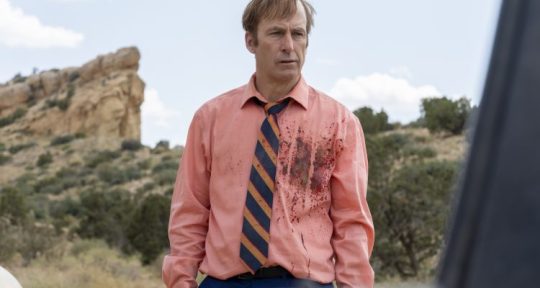
Bob Odenkirk on Naiveté, PTSD, and Kim’s Downfall
“The hardest thing for me was to play the naiveté of Jimmy as a younger person, where he starts in the series. You could say he’s become more cynical, but really, it’s self-awareness and I love that.”
Awards Focus: In interviewing your castmates, we’ve heard a lot of praise for your work. What stands out to you as a highlight for this season?
Bob Odenkirk: Well, we had a great season overall. But my favorite thing is the way Jimmy learns about himself and exhibits this sense of self-awareness. It’s great because the hardest thing for me was to play the naiveté of Jimmy as a younger person, where he started in the series. You could say he’s become more cynical, but really, it’s self-awareness and I love that. On the other hand, what he does with that self-awareness isn’t too good. He has these realizations about himself, but they give him an outlet to become ethically unmoored.
AF: Well, it’s funny because Kim, who seemed to know exactly who she was in previous seasons, looks like she’s losing herself. Does Jimmy worry that he’s opened Pandora’s Box?
Odenkirk: It’s a very strange thing, that last conversation. Because at first, you’re probably thinking that Kim’s just trying to make him feel less alone. Maybe she’s just trying to have some fun, make some gentle light out of those dark instincts Jimmy has. Or maybe she does it to make him feel a sense of his own limitations. But then those theories seem to fall flat, because Jimmy says, “Let’s slow down.” And she’s like, “No, no, no, let’s keep going.”
And she seems to genuinely mean it, to have some genuine delight in hurting Howard, who doesn’t really deserve it. Whereas Jimmy obviously pulls some crazy stunts, but those are more childish, almost like a teen prank.
AF: In talking to Jonathan Banks, we learned that he disagreed with the writers on some of Mike’s choices and he told them so. Do you have points where you’ve given the writers some pushback on Saul’s actions?
Odenkirk: Honestly, yes. There are moments where I say that “I think this is too far,” or that I don’t understand the choice. And most of the time, we’ll have a conversation where we come to some understanding on the story direction, which is to say I compromise (laughs).
After all this time, I like this character. I want him to make the right choices, almost like a friend. But sometimes the answer from Peter Gould is simply, “He’s not your friend, and he doesn’t make the right choices. That’s the story we’re telling. You don’t have his ear.”
And in the end, we know how those choices pan out. We’ve seen Breaking Bad and the road Saul takes.
AF: Yet there’s so much we don’t know, the arcs of other characters that have yet to be answered. Mike gives Jimmy a great speech about being on a specific road and not being able to get away from it. What road do you think Kim is on, going into season six?
Odenkirk: Well, I gotta say, when you see that last moment of season five, you get a glimpse at one of the core elements of the story. Because Saul is no longer asking himself who he is. Now he’s asking, Who is Kim Wexler?
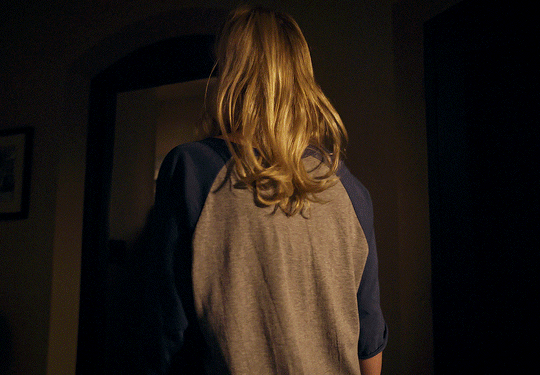
The woman who does that finger-point, gunshot gesture when asked if she’d harm an innocent man, who the hell is she? She’s done these little ethically compromised things, mostly as a team with Jimmy, with a kind of a sense of playfulness and partnership. But now there are real questions as to what’s going on in Kim’s head.
AF: The writers have certainly altered the status quo of the relationship between Kim and Jimmy over the course of season five. How do you navigate that as actors, especially in the context of broader character changes?
Odenkirk: There are definitely specific story choices and plot choices that are challenging to consolidate with the character. The moment where Kim asked Jimmy to marry her is one of those, where Rhea and I both wondered, How do we make this real? It was easier for me because all I had to do was act befuddled, which is how anyone in that situation would feel. It was harder for Rhea.
But I would say the hardest thing for me is when Jimmy’s doing a purely Saul Goodman thing, or doing something vindictive. It’s hard to understand that when you don’t have the instincts or life experience that might lead you down that road.
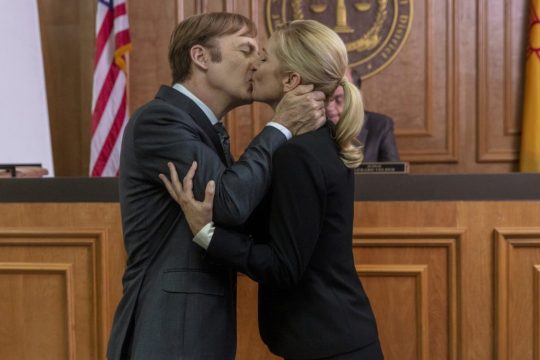
But that is a testament to the writers, they’ve given the character a sense of that now. Earlier on he would make these bad choices, and he seemed very blind to the ways in which these manipulative things would affect him and the people around him. Now he seems to understand how stuff can backfire. And he’s accepting that, moving forward with a stronger sense of realism. He’s choosing to be Saul Goodman in those moments. He’s more conscious about everything, from adopting the name to the flamboyant shoes and clothes. He’s choosing to play this role in part of his life, to give it a name, and to let that part of his spirit run rampant.
I love that development so much because the young Jimmy, he was hard to play because of his naiveté. As an actor, Saul’s self-awareness is great.
AF: In episode nine, you got to play a Jimmy who is not only physically beaten down from his trek through the desert, but also suffering from PTSD. It’s really unique to see him squirming in front of Lalo. Normally, he’d find something to say, but he’s in this weak state, and it’s just another facet you get to add to the character. The tension in that scene was incredible.
Odenkirk: Thank you. The thing is that Jimmy absolutely knows what’s happening. When Lalo says “Tell it again,” Jimmy knows he’s being played and prodded. He senses the danger, because this ploy can actually work. If you want to catch somebody in a lie, make him tell that story over and over. Jimmy knows what’s happening, but he’s too depleted to use his normal powers of logic twisting, to have the spirited energy for that kind of gamesmanship. But thank God, Kim comes through for him.
AF: Lalo’s terrifying in that scene and Tony Dalton brings so much to the character. What do you think’s going on in Lalo’s head as he listens to Jimmy?
Odenkirk: I think that was a tough one for Tony too, I imagine. You know, what’s going on inside that guy’s head who would usually just pull a gun and do it? He doesn’t care about anything.
But partly it might be that he figures he has Kim on his legal team. I mean, why not just keep her, she’s so good. If she’s got the grit and courage to give Lalo a piece of her mind, then she’s a good person to have on board.
AF: Vince Gilligan called episode eight the most challenging episode he’s ever directed. How was that experience?
Odenkirk: Yeah, filming in the desert was a brutal challenge, but even within the brutal challenge there was a kind of joy. I love when we have adventurous and physically demanding sequences. I just love it. One of the fun things about acting is going places that a real person doesn’t get to go very often. If they live their life with some degree of restraint and steadiness, it’s rare for one to find themselves lost in the desert.
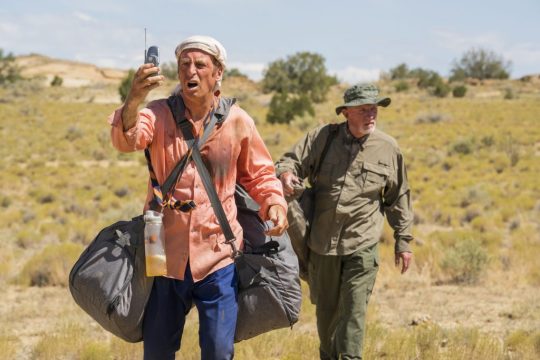
AF: During much of their desert trek, Jimmy carries two massive duffel bags filled with cash. Practically speaking, how was it acting with those for multiple days?
Odenkirk: If those bags had been filled with real money, they’d have been 75 pounds each. I don’t think I’d get that far with 150 pounds. Maybe a couple miles, which is a lot less than the distance Mike and Jimmy covered. But the bags were actually 40 pounds each, which is still very heavy. So the physical effort that shows up on the screen is very real.
AF: I’m assuming the heat was the bigger enemy?
Odenkirk: It was nightmare heat. And of course, you’re playing things over and over again. And Vince is an extremely thorough director who is shooting multiple, multiple takes from every angle. But it all worked out, because my suffering was essentially the character’s suffering. I was all for that stuff, as long as it was safe. When you have such a big crew and you’re out in the middle of nowhere with temperatures that high, it’s genuinely dangerous. It took a few days to bring in enough safety equipment to keep everybody on the crew cool. It’s definitely a bonding experience to take on something that big together and Vince did a wonderful job of shooting.
He could have made a two hour episode if he’d indulged himself with the amount of cool footage we got. But him condensing that, it was even more impactful that way.
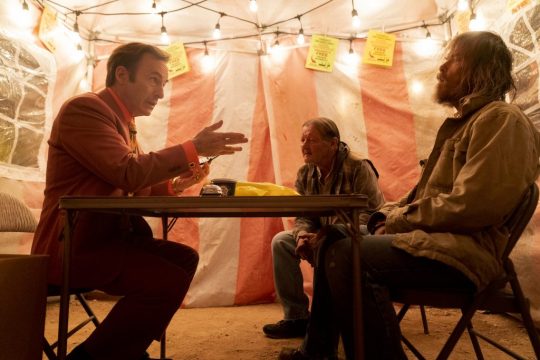
AF: This was a deeply dramatic season with some dark plots, but there was some comedic relief, like the cell phone tent scene. Is it as refreshing for you to perform those moments as it is for the audience to see them?
Odenkirk: Oh man, I have so much fun. I get really silly, and I really try to push it to the point where the writers want to tell me to pull it back a bit. But they wrote the character, and he’s a silly character, so I go with that. My trick is to go as far as I can, but try to sell it to an audience. For example, last season, I was at the grave pretending to feel at the one-year anniversary of Chuck’s death, because I know some of his law partners will come around to plant flowers and I want them to see me grieving. So I’m at the grave pretending to grieve and I’m actually saying “boohoo” as I cry. But I do it in such a way that someone approaching wouldn’t quite hear the word “boohoo.” I take these moments that the writers give me and push them as far as I can, because it’s really fun.
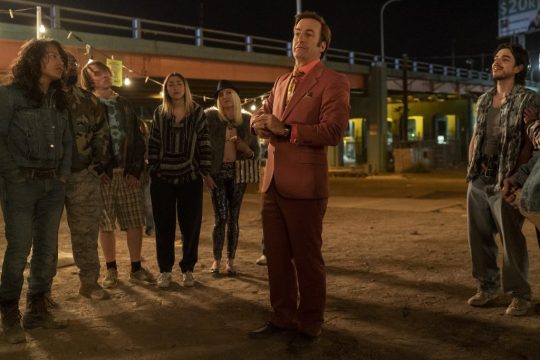
AF: One particularly funny moment featured Jimmy, a stunned Everett Acker (Barry Corbin), and a picture of a man having sex with a horse. What did you think when you read that, did you play around with various animal punchlines?
Odenkirk: No, we didn’t. It was written exactly that way and, in my opinion, it was perfect. By the way, Barry Corbin, who played Everett, is an absolutely great actor. I saw him in No Country for Old Men just the other day, and man, he’s great. I loved the absurdity of that horse picture scene. Jimmy knows how to rope in a client (laughs).
Part of AwardsFocus.com’s BCS interviews [x]
5 notes
·
View notes
Text
I’m not a fan of horror.
I’ve acquired a taste for things that contain horror elements, like Stranger Things, which contains moments of comedic heart and compelling character drama in addition to the horror, more so than say something with similarly disturbing horror moments like Alien or Aliens, and Shawn of the Dead, which is a romantic comedy spin on the traditional zombie apocalypse movie. And I’m more than certainly looking forward to checking out Lovecraft Country when it comes out. I’ve even gotten over my squeamishness concerning the face-melting in Indiana Jones and the Raiders of the Lost Ark, and the villain aging rapidly and ghoulishly into dust and then exploding in Indiana Jones and the Last Crusade.
Actually, one of my favorite movies to watch with my father was the original Predator, probably because it was as much a movie about an alien trophy hunter hunting humans for sport as it was a macho action movie starring Arnold Schwarzenegger. And unlike Alien and Aliens, didn’t involve that oh-so-disturbing means of procreation we all have come to know and love about xenomorphs. Which means that no, much as I’m chill with the Predator, I still have little desire to watch its crossover with the xenomorph menace, Alien vs. Predator, all the way through. Admittedly, I have, in the past, watched clipped reviews of the Alien movies, including AVP and even AVP Requiem, which I think if I had watched in full would have made me sick. Because my curiosity just gets the better of me from time-to-time, and I know that about myself only too well.
And as much I love Michael Biehn in a James Cameron movie, and was touched by the concept of the found-family storyline in Aliens, I just don’t think I can stomach those chestbursters (ha ha).
I can’t even watch John Hurt reprise his role as “Kane” in a parody of his iconic horror scene in Spaceballs, and, like Shaun of the Dead, that’s a comedy! Even more so than Shaun of the Dead! Well, I do watch the part after when the CB sings, “Hello My Baby,” but by that point the parody of the worst part of that scene is over and done with, and there’s nothing but the joy of a dancing baby alien with Michigan J. Frog’s singing voice coming out of it while John Hurt “Kane” laments, “Oh no! Not again!”
And however compelling The Exorcist is in terms of character…yeah no, not touching that.
It is weird though given how far I’ve come in tolerating horror gore, but that’s just not a line I’m willing to cross yet as of writing this.
But back on track.
Sprinkling this in to counter-balance the PTSD I get from the mere thought of xenomorphs.
A few weeks ago, I got a taste for a different kind of horror, and honestly the kind I’ll take over gore in a heartbeat, even if both equally can get stuck in my head to an ugly degree. And that was rewatching M. Night Shyamalan’s The Sixth Sense. Probably because I got it in my head to watch Ari Aster’s Midsommar, and I still needed something else to fill out my creep-factor quota. I thought about backpedaling and watching his film before that, Hereditary, but I already know that that one ends far more bleakly (compared to Midsommar, depending on how you look at it, mind), and I needed something that was creepy and tragic, but had an ending that positively affirmed itself.
Then I remembered that The Sixth Sense sort of did that, and it had been a while since I had seen it, but I remembered it from as far back as childhood, me with my parents, adamantly not understanding how they could be fans of things like Alien and Aliens. More than that, I remember actually being able to enjoy Sixth Sense somewhat, even then. Appreciate it for its horror elements and moments of tragedy, rather than shrink away from it.
So I that’s what I did. And for all that Shyamalan has done (botching the first attempt at a live-action adaptation of Avatar: the Last Airbender chief among them), this one still gets me in the feels. Helps, I suppose, that I faced certain deaths and griefs at a far tenderer age than I was “meant to”, but even so, what Shyamalan does best, he does best here. And probably in Unbreakable and even Split too, but I haven’t seen those, and apparently after all that, Glass got panned so…yeah.
Still, if nothing else, it was fun to remember that Toni Collette was in this, and now that I’ve grown and seen her in things like Little Miss Sunshine, and clips of–that’s right, Hereditary–not be surprised, but no less pleased for her performance. Not only is she in a Shyamalan film that works its earmarks to its advantage, but she sells her character as a single mom at the end of her rope, with both a son, Cole, going through a difficult time that they can’t talk about, considering the kid knows what she’d think if he told her he sees dead people, and haunted by the death of her mother with whom she clearly had a difficult relationship. Not saying that this still couldn’t have worked, but given what The Happening did to Mark Wahlberg, color me double-rainbow impressed.
Bruce Willis too. Plus he had the advantage of working with Shyamalan on Unbreakable. So he probably knew how to play things in either situation. That and it’s honestly not a badly written character, all things considered, any more than Toni Collette’s character was. Or, even if it was, again, he sold it with his performance. He has a handle on subtle gravitas as much as he does going toe-to-toe with Alan Rickman (rest in peace) playing a terrorist.
Picked this one for the nostalgic fondness of, “Rent it on video. DVD’s also an option!”
Then you have Haley Joel Osment as Cole. And again, given he’s supposed to be this awkward kid with the added burden that he can see ghosts when no one else can and they scare him and even if he tells someone no one will believe him, any stiffness that comes with the Shyamalan style makes sense here. Death makes everything…stiff. Moreover, he sells it too. I get a lump in my throat just thinking of that moment when, after he’s at least told Bruce Willis’s character, as his therapist, about his secret, he tearfully demands, “How can you help me if you don’t believe me?”
Then there’s the revelation itself of the probably reason the ghosts come to him in the first place. Even if they’re not appearing to him with any conscious desire, some subconsciousness of their incorporeality compels them.
They need help.
In death, they’re lost, but maybe, as Cole’s still alive, there are loose ends he can tie off that they can’t. Not that he should, or even can–like I’m not sure what good he can do for that deceased housewife who clearly committed suicide to escape her abusive husband–but when he’s visited by the girl who’s mother poisoned her to death in a little fit of Munchausen-By-Proxy Syndrome, and he goes to her wake, finds the tapes that prove her mother’s guilt, gives them to her father, and the father confronts the mother about it, that got me more even than it did when I was younger and still trying to wrap my head around the concept of mothers poisoning their daughters.
That’s when things start to turn around for Cole. It’s still scary, but he takes that leap of faith, if you will, and one of the last times you see him with a dead person he’s conversing with them rather normally. Going over lines with them where he gets to play Arthur in a reenactment of the legend of the sword being pulling from the stone. You don’t even realize they’re another ghost until his teacher asks him who he was talking to and the ghost turns her head and you see the burn on the other side that obviously came from the fire that killed her. There’s just something so pure and honest in that, the idea of not only facing your fears, but doing so for the sake of lost souls who otherwise have no other hope because they’re dead.
After that is the one-two punch feels conclusion.
One being Cole not only confessing to his mother at last that he sees dead people, and her clearly starting to freak out about it, until he tells her that, “Grandma says, ‘hi’.” And communicates to her something that her mother never got to tell her herself. Of course, after thoughts of, “Oh dear lord, my son is insane,”, when the proof that Cole has indeed been talking to her mother’s spirit, that goes out the window in favor of,

“Do I make her proud?”
and she just cries and she and her son hug it out. And again, Toni Collette sells it.
Then you have the revelation of Bruce Willis’s character: he was dead the whole time! His wife wasn’t just distancing herself from him and then maybe cheating on him, he was dead and she was a widow who was simply trying to find love again. A moment of horror, and then tragedy, and then bittersweet letting-go all in the last few frames of the film. There’s the two in the one-two punch.
Not to mention my first experience of a “Shyamalan twist”. One that was set up well. Scenes constructed to lead you into thinking that of course he’s alive, details you glaze over, and then you realize, “Oh sh**.”
Which was probably part of the problem with some of his later works, where the twist became synonymous with his style, so sometimes it felt like they were put in there in future movies of his without any real rhyme or reason other than that the public were expecting them and thus somehow obligatory to the script.

Just as I haven’t seen Unbreakable, or Split, and certainly not Glass, I haven’t seen The Visit, either, though from what I understand, it almost sounds like Shyamalan went back to the same headspace he had here in The Sixth Sense, using the awkwardness that seems to come out in his work to an advantage in the found footage format. And the twist was apparently actually hilarious. Which is nice. Good for him.
Not everything someone makes is going to be a hit, even if they’re getting paid for it. But when things are a hit, sometimes, they hit so well that it can make up for all the misses. Or almost make up for them.
Honestly, Sixth Sense is, ultimately, the only Shyamalan film I’ve seen in full. But I enjoyed it no less this time, in fact, enjoyed it more now that I have a better understanding of death and grief and loss.
Guess that’s kind of a weird thing to say, but it’s that same kind of “enjoy” that comes from feeling like someone understands something about something you understand, and maybe even feel a little bit less alone for it. Not only did I experience a lot of grief as a preteen, but before that, I was the weird one that most everyone else at school generally avoided if not viciously teased, with the exception of a few fair-weather friends. All these elements and story beats used to creepy effect in Sixth Sense, along with that sense that some horror doesn’t so much horrify me as actually make my own life seem brighter rather than darker, made for a viewing experience that I place value in as I write this. (Especially given right now we are all apparently living a Stephen King novel right now.)
So even if I still can’t handle body horror to the degree of stuff like Alien or Aliens, or David Cronenberg’s The Fly (much as I would love to see Jeff Goldblum in all his 80s hair awkward nerd glory as he romances Geena Davis), there is some horror I can handle. And figuring out why is yet one more thing that I place value in.
Keeping this link up to their donation page!
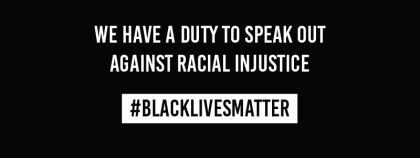
Sixth Sense Post I'm not a fan of horror. I've acquired a taste for things that contain horror elements…
#abuse#action#alan rickman#alien#aliens#ari aster#avatar#avatar the last airbender#bruce willis#david cronenberg#die hard#geena davis#glass#haley joel osment#hereditary#horror#indiana jones#james cameron#jeff goldblum#john hurt#kane#little miss sunshine#lovecraft country#m. night shyamalan#mark wahlberg#michael biehn#michigan j. frog#midsommar#munchausen-by-proxy#murder
2 notes
·
View notes
Text
Ciconia no Naku Koro ni Phase 1 : To You, The Replaceable Ones
I had planned to write this… review? analysis? of Ciconia Phase 1 right after finishing the game about two weeks after its release, but since then I've had trouble organizing my thoughts. The reason is that this first installment alone tackles a lot of themes: war, nationalism, technoscientism, media consumption and manipulation, the blurring limits between physical and virtual reality, education systems, generational gaps induced by technology, artificial procreation, old people robbing the youth of their dreams, the meaning of family and interpersonal bonds, and even transidentity (albeit briefly). And it is quite remarkable that almost all of those themes are represented by one object: the Gauntlet and the idea of “parallel processing” associated with it.
It's gonna be a long and messy review, I'll probably forget to mention some aspects of the story or overlook others, and I won't talk about every single character, but I'll try to cover the essential parts. Not easy considering how densely-packed the story is, but let's go!
So to start, I should probably focus on this VN's protagonist, Mitake Miyao. On a surface level, he's a bit of what you'd call a “tsundere”: harsh, a little irritable and sarcastic with his pals, but always well-meaning and easy to befriend in the end. One of the running threads of the story so far is that he's too well-meaning in fact, idealistic to a fault, which contributes to his odd charisma but also makes the increasing realization of his powerlessness all the more depressing. You don't want to see this guy fail, but because of the way the story is framed, you know he inevitably will.
For a while, the narration and dialogue like to repeat that “youngsters are each generation's main characters”, but that's a sentiment I couldn't quite share − in our real world, youngsters may be the ones will all the dreams, but they sure as hell aren't the ones making the decisions. The climate change crisis, for example, wouldn't be left unaddressed if that was the case. And sure enough, Ciconia isn't so naïve as to ignore that reality. Every single step of the way, Miyao thinks he can use his power to overturn the situation. Every single step of the way, he's reminded that in the end he's just a pawn moving however his higher-ups or other nebulous forces wish him to. That's a really powerful and relatable theme in this day and age, which raises the question of how far you can oppose a system you're an essential part of.
One thing that makes Miyao special, at least compared to his pals from the AOU, is that he's “ciconia-born” − born from natural procreation. Which means that unlike Jayden or Gunhild, he has bilogical family bonds but also hasn't been subjected to a genetic selection that would predetermine his path in life. At least supposedly, but we gradually learn that that may not quite be the case. In fact, that biological link to Toujirou ends up acting as a tether that robs Miyao of even more control on his own life than he thought, leading to the final tragedy of this first Phase.
There also lies this story's commentary on technology and man's increasing dependence on it − technology makes the kids' life easier, but it's also their undoing. One technology prevented an apocalypse that another caused, and the loss of the former brings about a new apocalypse. Humans created the 8MS but only a handful of scientists have a full understanding of how it works, just like today's technology are only fully understood by a small elite of technicians. We are increasingly dependent on tools whose principles are increasingly out of our grasp. Again, the Gauntlet is another reflection of that.
But back to Miyao and the Gauntlet Knights. In retrospect, it is clear that the way both the characters and readers learn about most dramatic developments through disincarnated news reports (with a goofy “news flash” alert by the frog AI Keropoyo to make it worse) is meant to build up that feeling of powerlessness, and also of disconnect. We should be alarmed that war is approaching, that terrible things are happening… but it all feels distant. After all, do you cry or tremble in fear when you learn that an eathquake killed a thousand people on the other side of the globe? No, you'll think “it's terrible” for a minute and then move on, because what can you do about it? Reading the second half of Ciconia felt a lot like that. And while that's part of the message, it is also to the detriment of the reading experience a lot of the time.
For a while (around the 60-to-80% portion of the game, roughly) we get a lot of redundant dialogue about commenting the news and Miyao rambling on about how they're all COMRADES MAINTAINING THE WALLS OF PEACE, again and again and again, to the point it becomes annoying. That's my only real gripe with the game − the feeling that, at times, Ryukishi forgot he was writing a story and went into political or philosophical essays about its themes instead. Maybe a manga or anime adaptation could help make these parts more… show-don't-telly. But as it is, it could have used some serious trimming down. That's hardly something entirely new − who can forget Krauss' tangent about 1986 Japan's economic situation or Beatrice's explanation of Hempel's crow? But in Ciconia the narration doesn't seem to come from any specific point of view except that of the author (and even on that front, the opening disclaimer warns us that the views expressed don't necessarily reflect the author's opinions), so those parts become all the more conspicuous. Unless this all turns out to be part of a Witch's game, which wouldn't be surprising.
Where Ciconia shines however, is at weaving a web of connections between the characters, one by one, to make you care about some and suspicious of others, sometimes both, and deliberately confuse you about who really controls whom. First we have the kids, with Warcat and Grave Mole which instantly grew on me (the slice-of-life TIPS focused on them had some of my favorite scenes actually), then the other kette with their own quirky charms… then the “villains”, with Toujirou and Seshat, then the Three Kings and Jestress who has a delightful dynamic with Toujirou, and then Toujirou is revealed to be Miyao's father, etc... It's a testament to how well all of those characters are established that I could remember almost all of them very quickly despite their massive number. Save for the Cairo Squad maybe. They're just kinda there. The (mostly) gorgeous character designs certainly help, even if Ryukishi still has a somewhat loose grasp of body proportions and of the… number of fingers on human hands. There's some improvement even in that department though.
While Miyao is for the most part the center of the cast, at least on the kids' side, that doesn't mean the others aren't interesting in their own right. Jayden is your classic “best buddy dudebro” whose easygoingness lets him bounce off Miyao's more strait-laced personality in a fun way, but his relationship with Meow, Miyao's “little sister” who shares the same body, allows him to show more sensitivity and shyness he would otherwise have. Speaking of Meow, she brings about another interesting element of worldbuilding − the existence of “Congenital Parallel Processors”, or CPPs, i.e. people born with multiple personalities, who are not considered mentally ill but a full-fledged minority with its own issues and “coming outs”. Although that aspect isn't developped much (Meow herself kind of disappears from the radar in the second half), we do get other examples of how it can manifest, notably with the character of Naima, whose unnamed alter-ego is violently protective of her, or Rukshana who's prone to abrupt personality changes when she laughs. The way Jayden kinda walks on eggs but genuinely tris to to treat Meow as her as her own person while respecting her and Miyao's privacy is frankly adorable, and I almost wish we got more of that at least in the TIPs!
The kette I found the most interesting, though, was Grave Mole, composed of Chloe, Lilja and Koshka. While a lot of characters have issues, all three of these girls are complete mental wrecks to some degree. Koshka spends her time between grumpily taking part in Kizuna chat rooms and horrific body experiments (usually simultaneously) when she's not training, Lilja has to take drugs to pretend like she's a happy, cute and mischievous cat-girl for the sake of making Koshka a more-or-less functional human being, and Chloe has to constantly deal with unfair punishments and a constantly battered self-esteem. As comedic as Okonogi's angry rants and karate-chops are played (and as much as I like this version of Okonogi, strangely enough), that scene where she gleefully lets Lilja be killed in battle makes it clear that her mental state is just as unstable as the other two's.
On the antagonists' side, things are a lot more blurry: a lot of them utter the arc phrase “All is in the name of guiding humanity down the right path.” However, what the right path is seems to vary depending on who says it. That's where a lot of the mystery lies − be it with Jestress, Seshat or Toushirou, their goals seem contradictory, and Tak… I mean Vier Dreissig doesn't even seem to have a goal beyond SCIENCE. But a big part of Phase 1's hook is that constant uncertainty as to who is playing whom and for what purpose. Even the Three Kings, who seem like your bog standard Illuminati knock-offs, might not be as much in control as they seem − hell, one of the big catastrophes (the fatal damage to the atmospheric 8MS) happens completely outside of their control, in an almost comically sudden way.
Speaking of comical… let's get to what I found personally fascinating but what other readers might have gripes with: the brutal tonal shifts and dissonances throughout the story. A cheery scene to announce the big success of a plan for the Order of the Public Bath? Keropoyo pops up to gleefully announce… an avalanche of terrible news that make the success from a minute ago meaningless. A big conference for peace where World War IV will most certainly be stopped? All of its participant die in an “accidental” explosion. Not to mention characters that are walking balls of tone dissonance like Chloe (who has many comical scenes but is clearly broken beyond repair) or the Yeladot Shavit girls (who by the end are forced to spew out fanatical bullshit with the same sparkly smile they sport when gushing about yuri ships).
This is of course embodied by the incredible climax where all the Gauntlet Knights celebrate their comraderie together in a virtual room… while their real selves are busy killing each other lest they're court-martialed for treason. The moment where all of Miyao's ideals are brutally trashed and scattered in a battle we don't even know the purpose of. The moment where the kids' taent for “parallel processing” becomes their sole mean of escaping the horror of their situation. The moment where all the absurdity, all the unfairness explodes in a depressing flourish. The moment also where the thematic resonance with Umineko becomes fully apparent − how can we not be reminded of Sayo and Maria escaping their shitty lives through their magic? Though of course Rose Guns Days also constantly came to mind, with the focus on war and nationalism, Japan being divided between a union led by the US and one led by China, and two of Miyao's closest friends being the American Jayden and the Chinese Lingji; as well as Miyao being an idealistic and charismatic leader-by-circumstance whose dreams crash into a wall much like Rose's in RGD.
So…
All in all, Ciconia might not entirely be what I expected from a When They Cry game, but it is certainly what I expect from a 07th Expansion game: a thought-provoking experience. Again, I finished my reading shocked and confused. Although it might seem like it shows its cards more explicitly than the openers of Higurashi and Umineko, deception still plays a big part in the story, even if the interaction with the reader is less direct.
Now there might be no murder mystery for the reader to solve, but that won't stop me from speculating! The invisible turning point to me is the “Proof of a Program” chapter, where Blue Miyao tells Miyao that he'll show him someone's face, and that that will activate Miyao's murder program instantly. Miyao first laughs it off, but then the scene brutally cuts to something that might be a flashback, a flash-forward or a nightmare, maybe all of that at once… The most graphically horrifying scene of the entire game, to the point it's almost at odds with the rest. And then… it's never mentioned again. Not even when Miyao meets again with Blue Miyao. Like it never happened. My theory is that everything Miyao experiences from that point onward is some kind of simulation, and that's where the obligatory When They Cry time loop will come from this time. See you in May for the answer?
That is all for today, folks!
12 notes
·
View notes
Text
Opera 2020: The Rake’s Progress (1/99)
So I’m gonna do a little post for each of these operas that I watch and give some thoughts on it (kinda like I do when I finish a Shakespeare play, but possibly a little more organized? we’ll see...). I figured that I would start with The Rake’s Progress, since I am still interacting with that work, even though I listened to it at the end of 2019. I’m not going to do a post for Xerxes because I saw that opera nearly a year ago (so if anything, I’ll listen to it again once I’ve listened to the others).
* * *
Alright, y’all. I won’t lie. I’m a little obsessed with this work now. If you haven’t listened to The Rake’s Progress and you enjoy some opera, I highly suggest having a listen. There are also wonderfully staged performances that you can watch on YouTube that have been so fun for me to watch because I adore this opera. It’s just a fun, seductive, flirtatious thrill ride with tomfoolery and hell-raising for two and a half hours, (with an ending that seriously messes with my entire emotional state).
In fact, I’ve enjoyed listening to this opera so much that I’ve begun to do research on the opera itself, as well as some academic questions related to the work. On a larger scale, this project that I’m unofficially undertaking involves the stock character of the rake and the literary (and possibly the musical) imagination. It is something that I’ve only just begun working on, and am possibly poking at the idea for my thesis, but I am still unsure as I thought I would be doing that on something Shakespeare related. For now, I am looking at Stravinsky’s work (which premiered in 1951) under the lens of a few questions that I want to apply to other works as well (and these are just preliminary research questions - aka things that came into my head as things I wanted to think about - some of these might be rather dull):
- What is it about The Rake’s Progress that excites us as an audience? To put it differently, what is it about that story that works? Is it the extravagant setting? The high-stakes hell-raising that takes us on a jostling roller-coaster ride to a 180 degree cliff face from which we have nowhere to go but down? Or is it the inevitable moral at the end? The relief that we’re not in the same position as Tom Rakewell? In experiencing Rakewell’s story second-hand, is there a kind of fascination there with looking in on a world that almost appears fantastical? Some combination of these? Which elements stand out more than others as being successful?
- What inspires an author to make their main character a rake? What inspires them to go down the road of the ‘progress’ once more? Do these authors always have a restoration type setting in mind for their work? Why are we so easily able to move out of that time period?
-Based on the different representations of the rake and his progress, can we develop a traditional trajectory for how his story will go down? Is it more similar to Hogarth’s artistic interpretation or more different? What changes have had to be made due to the circumstances under which the author wrote, or were made for other reasons? Were these changes successful considering the medium?
For Stravinsky’s The Rake’s Progress, the work takes a kind of neoclassicist approach, in which Stravinsky refers to the work as a “period-drama”. He intended for his opera to be set in an eighteenth-century setting, but from what I’ve seen being staged, it certainly has not remained that way. The elaborate restoration setting (something out of Hogarth) actually seems to reveal something interesting about the characters, and reveals that this opera is something quite post-modern.
What happens in The Rake’s Progress is that we have some characters that are actually aware of their existence in the opera itself, some feeling somewhat trapped by that limit of just being in a show (in which their course is already set for them), and some taking it for what it is, or even taking advantage of it. Some characters are not aware of this at all. Tom becomes more and more aware of his existence as a character as the show goes on. He hopes that his written fate is a good one at the beginning, then in trying to take control of it in a state of maddened anxiety, destroys his other self (Nick) and subsequently goes mad. He falls into the first category of characters, as one who is trapped. Baba is totally aware that she’s just in an opera, and she’s going to make the best of it. She even recognizes it in her libretto during the epilogue (”Good people, just a moment”), “all men are mad, all they say and do is theatre”. She takes the situation for what it is. Nick takes control of it and like Tom, tests its limits, though that later comes to his downfall when he is dragged back down to hell for suddenly changing to rules and allowing Tom a chance to destroy him. He also laments this fact in the epilogue, “day in, day out, poor Shadow/ must do as he is bidden./ Many insist I do not exist./ At times I wish I didn’t”. However, this line comes across as more comedic than tragic. Anne and Trulove do not seem to recognize that they are only part of an opera, though this is somewhat contradictory given the nature of the epilogue in which the five primary characters sing a song very clearly addressing an audience who has been watching them this entire time, in which Tom has come back to life to do the same (clearly out of story-line). So not only does the epilogue help the moral of the story: “for idle hands, the devil finds work to do”, but it also shows that these characters are aware that they are characters and that they are putting on theatre.
Another thing that has interested me was the relationship between Tom and Nick, and the possibility that Nick is a part of Tom, being his “Shadow”. This becomes somewhat complicated because on stage we see them as separate entities, separate bodies, and they sometimes act independently of one another. As far as the audience is concerned, they are two different characters, and visually they are two different people. However, when one applies the thought that Shadow is only just a part of Tom, all sorts of questions can arise. For me, it makes Tom an even more unstable character. Having done a little bit of score study, his lines are often tonally in opposition with the orchestra, or sometimes he’s so nervous that he doesn’t start right on the downbeat of a measure, but an eighth note behind it. This is especially apparent in the Graveyard scene. Additionally, Tom’s nervousness and instability is shown in his constant key-changes, the way his key pushes against the music played in the orchestra. In the first scene in which he is mad (”With roses crowned”), he sings Nick’s melody that he sang in the graveyard scene: three eighth notes followed by a dotted-eighth, sixteenth pattern, losing sight of his own melody that he had (which in itself was highly unstable, once again having many phrases that did not start right on the downbeat, though some did).
Regardless of score study, the idea of having these two characters be a part of Tom almost makes me want to toy with the idea of Nick being a vision to him throughout, a vision that is more handsome, less hesitant, and more willing to exercise free-will. (I was joking earlier that Shadow’s either gotta be really creepy or really hot, but now I think it’s whether you want him to come across as a devil or as the other, more-reckless part of Tom). It makes me think that the whole graveyard scene could be some drawn out suicide attempt rather than an opposition between man and devil, which if allowed the luxury of a film version, could possibly be done. In such a case, it could be argued that Tom’s been on the verge of madness this entire time, but his destruction of Shadow finalizes it. However, again, having two figures on stage during that scene playing this elaborate card game would suggest that we are to imagine a card game with the devil, rather than a man imagining his other self threatening him.
It also calls into question how much sympathy we should (or shouldn’t) have for Tom by the end. If we believe that he is cursed to madness by a devil figure, then perhaps he is more likely to gain our sympathy than if this was caused by his own hand pushing Shadow back into hell, or perhaps into non-existence as is mused by the epilogue. Furthermore, the opera does not end as Shadow is defeated, but after Tom’s (Adonis’s) death. In between these two deaths, we get a heartbreaking reunion between Tom and Anne, in which Tom as Adonis is asking his Venus for forgiveness. “What should I forgive?” she responds with almost too much innocence. Despite the fact that Anne was tossed aside during Tom’s wayward adventures in London, his love for her never seems to fade. Even when he is married to Baba (for that short and wild time), Anne is always in the back of his mind. In Bedlam, we are almost brought back to the Elysium of the woods. It’s almost out of a pastoral, but then we are bitterly reminded that these are no idyllic woods, but rather “a common darkness... in a night that never ends”. So perhaps the question is not of a moral choice of whether we should or should not have sympathy for Tom, but rather do we have sympathy for Tom. The answer for me will always be a yes, and I think that is one of many things that makes The Rake’s Progress an effective work.
Of course, there are a lot more thoughts I have on this particular opera. The other posts about these operas that I’m going to be listening to will not be as long as this one. I’ve just taken a deep interest with The Rake’s Progress because, as I said before, it’s an absolute joy-ride. I highly recommend giving it a listen. There’s an excellent recording with Ian Bostridge as Tom Rakewell (and I am so upset that they didn’t make an entire production out of it because they should have - it’s scary good). There’s also a fun production on YouTube that was done in Aix in 2017 starring Paul Appleby and Julia Bullock that I love because it’s 9000% more extravagant than it needs to be, but I’m 9000% here for it. The staging is wonderful, to say the very least.
#year of opera 2020#the rake's progress#igor stravinsky#opera#don't mind me y'all#just throwing a bunch of analysis your way#but seriously i highly recommend#it's such a good opera#and it's in english so if any of you are opposed to opera because you don't understand the other languages#this one's for you#i personally love a good opera in any language#but sometimes having it in your mother tongue is nice#i'm just so mad that they didn't stage the ian bostridge one#because can you imagine how good that would be#that's why they didn't#it would be too good it'd break our skulls#i kinda want to do a thesis over it#but i know i shouldn't#because my shakespeare professor said that he wanted to do a thesis with me#as did this other professor that is like scary amazing#like idk if y'all know the feeling of ayanna thompson saying that she's interested in your work but it's pretty freaking amazing y'all#i want to be her when i grow up so i can't possibly turn down the prospect of working with her on something#hehehe#classical music#tom rakewell#nick shadow#anne trulove#baba the turk#:)
4 notes
·
View notes